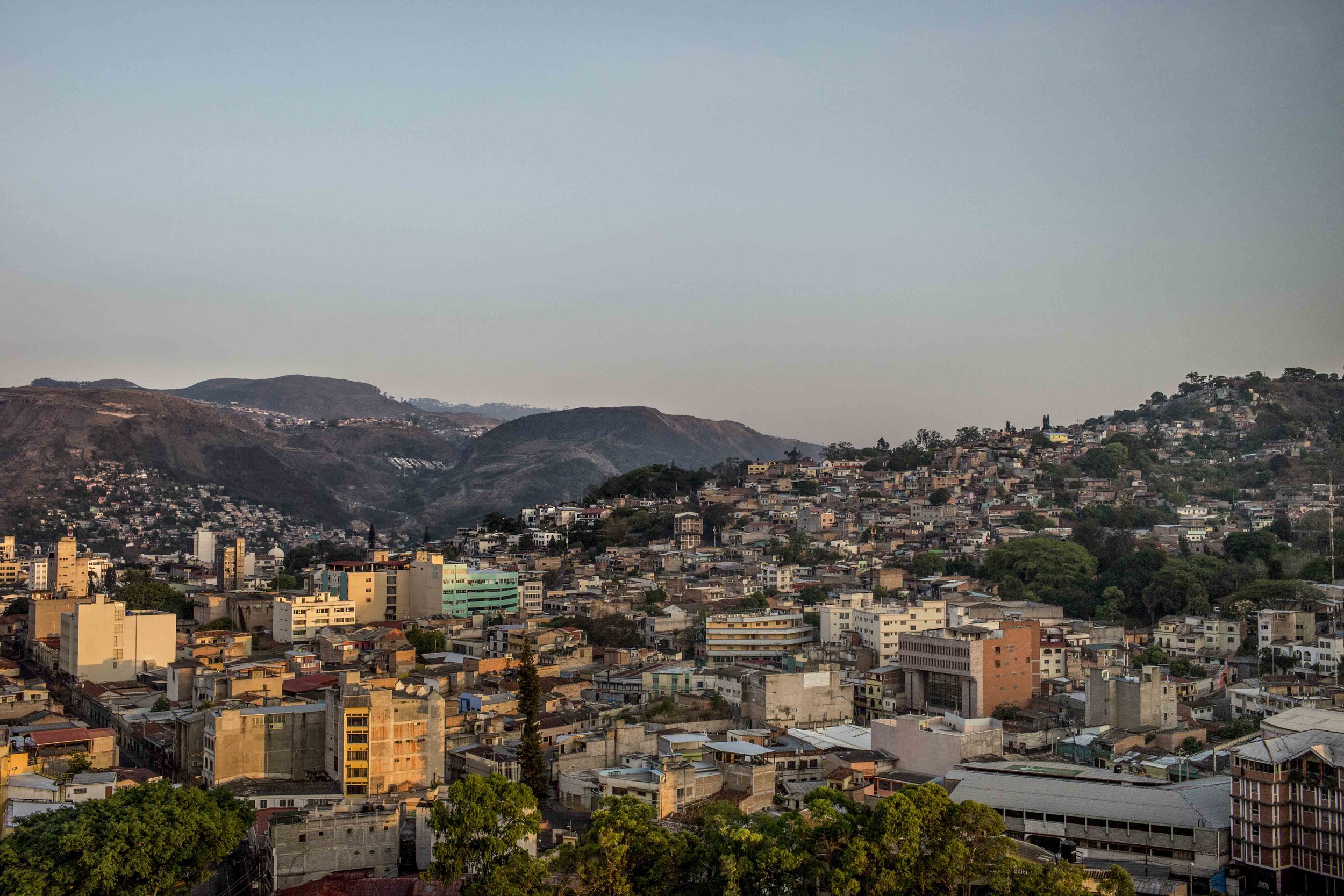
Tegucigalpa at dawn, capital of Honduras.
Youngsters tend to leave the countryside areas, a hotbed of violent con ict over land, to pour into big the two major cities of Honduras, Tegucigalpa and San Pedro Sula, where they find no job opportunity and this makes them more likely to end up working for the gangs.
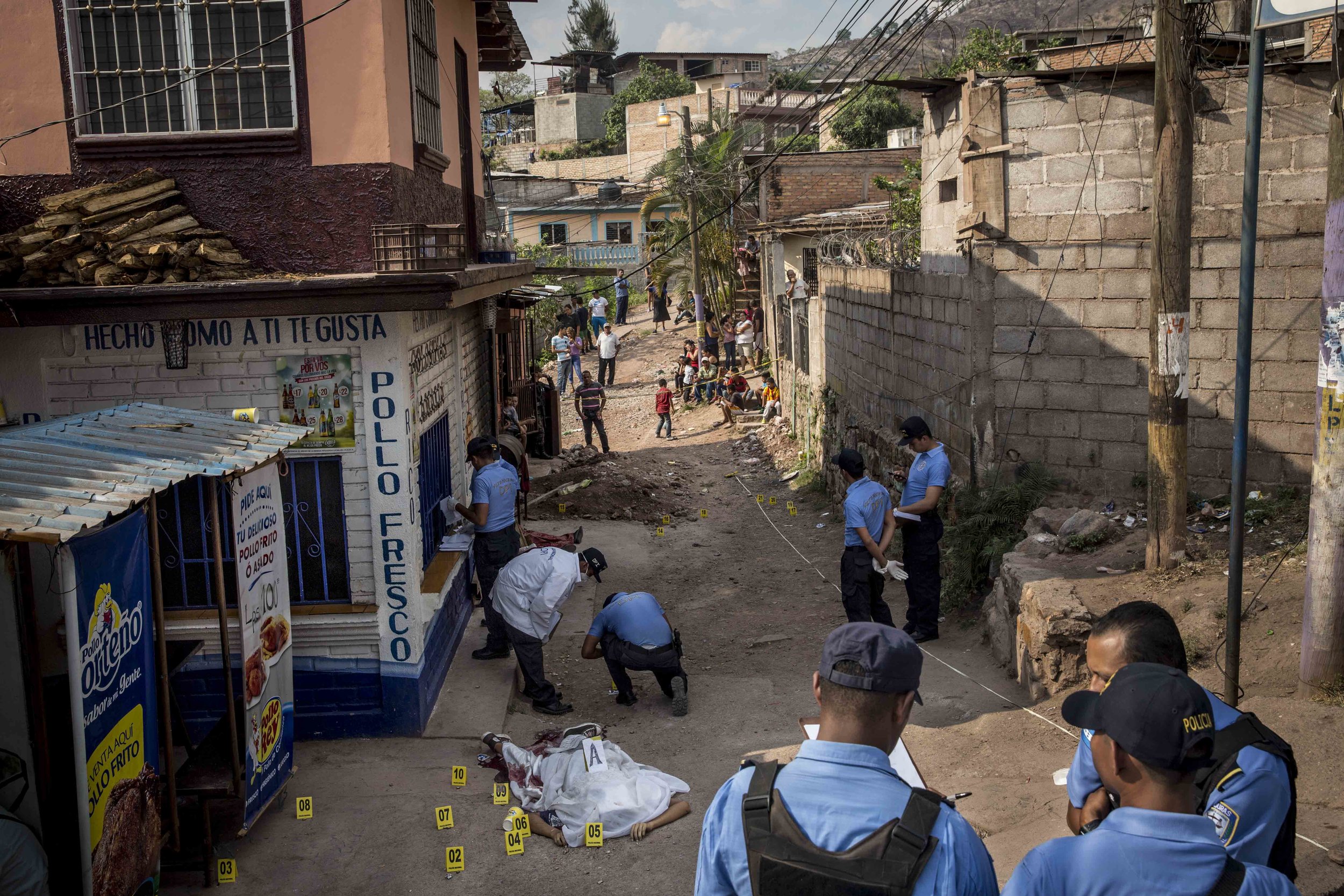
The crime scene of the murder of two brothers, Carlos Amador 22, and Edwin Amador, 20, murdered in cold blood in the streets of the Suyapa district, Teguciaglpa, capital of Honduras.
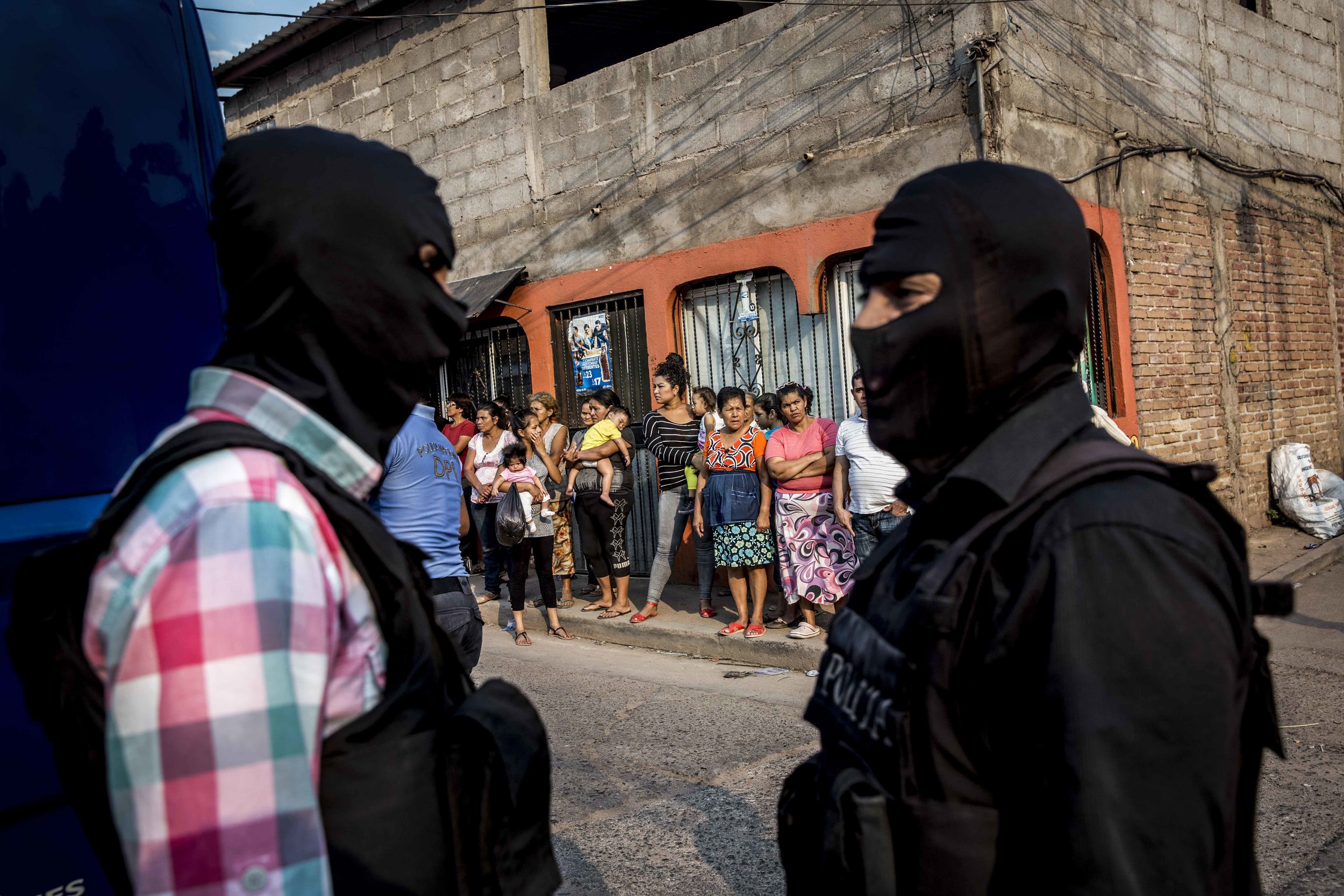
Police on the site of the murder of two brothers, Carlos Amador 22, and Edwin Amador, 20, murdered in cold blood in the streets of the Suyapa district, Teguciaglpa, capital of Honduras.
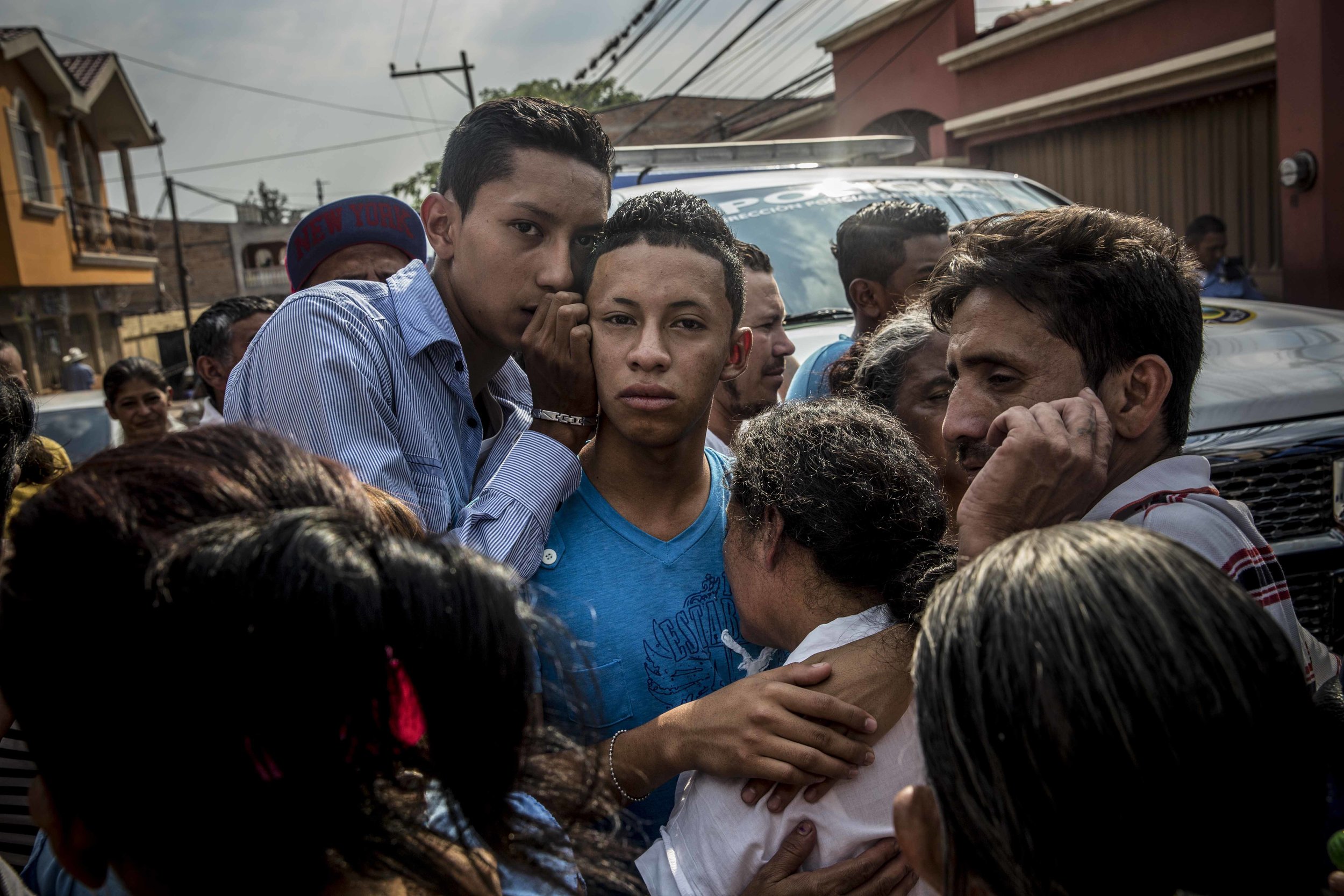
The relatives, brother and mother of two boys, Carlos Amador 22, and Edwin Amador, 20, murdered in cold blood in broad daylight on the streets of Suyapa neighborhood, Teguciaglpa, capital of Honduras.
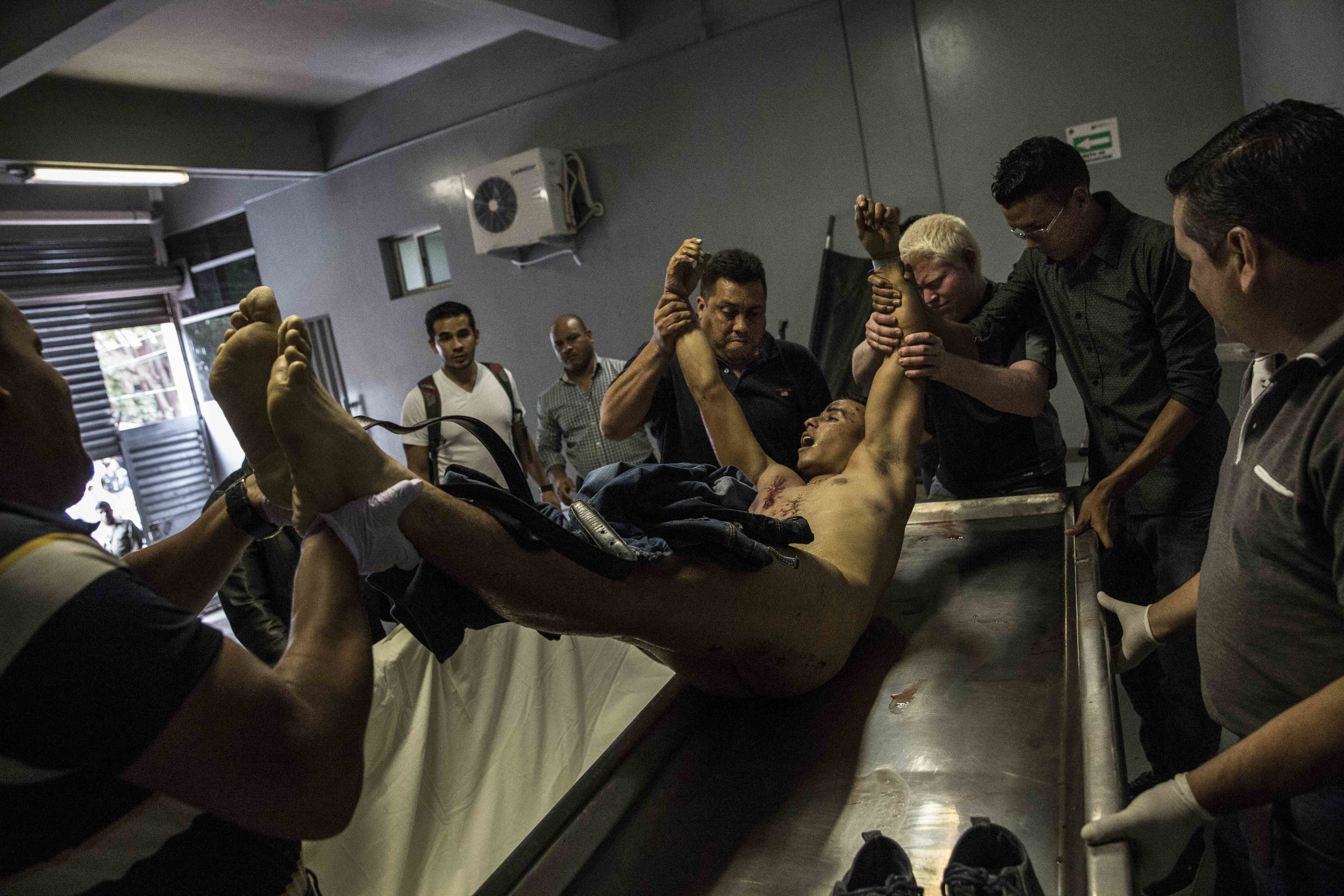
Junior Ixael Osorto Banegas, 18, murdered with machine guns the night before in a neighborhood of the capital city Tegucigalpa.
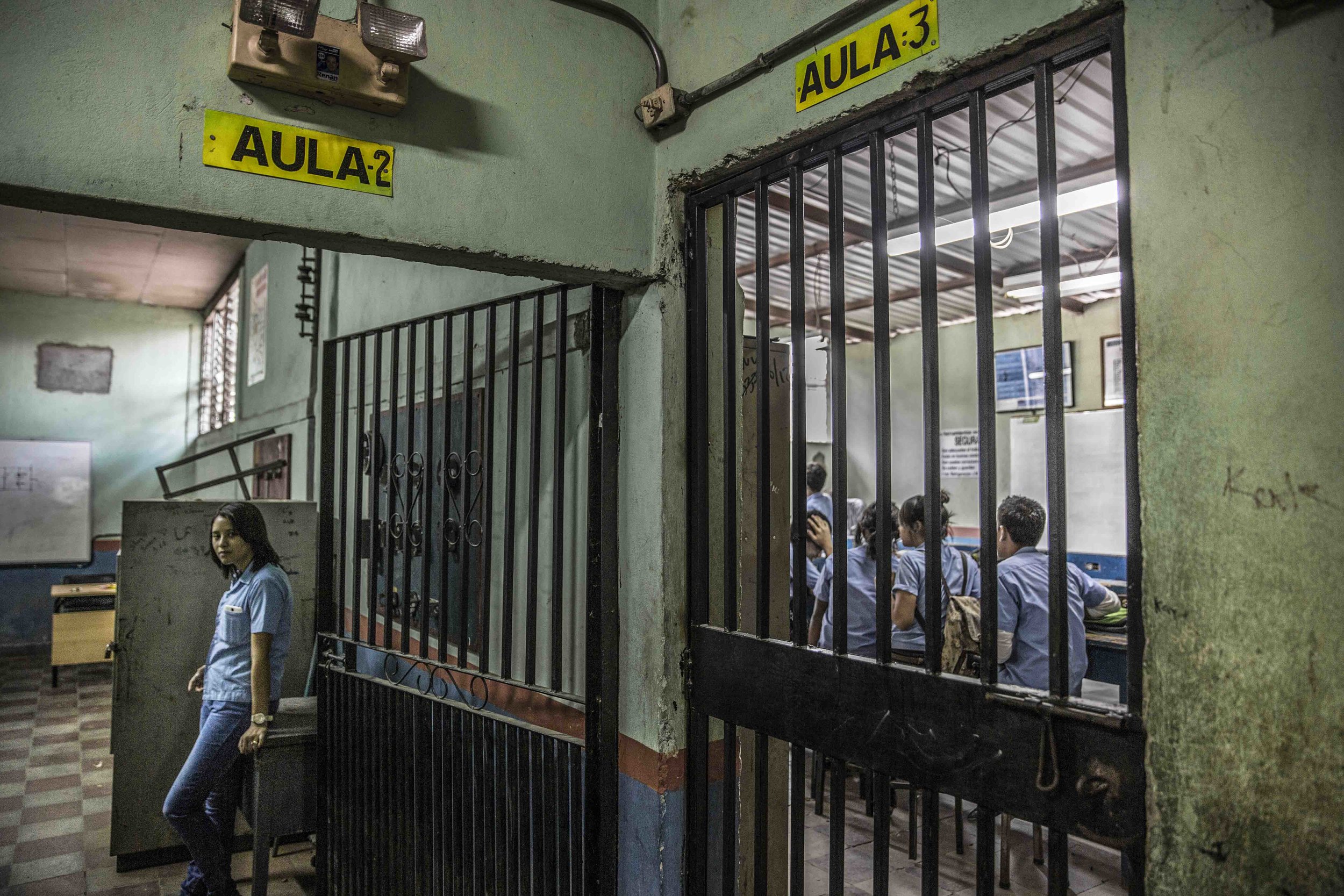
The gates as classroom doors in a vocational school of the capital Tegucigalpa. This neighborhood under the control of the 18 Street Gang (M-18). The M-18, it is also known as the army of the children, because of the age of the members, which are often recruited in schools like this one.
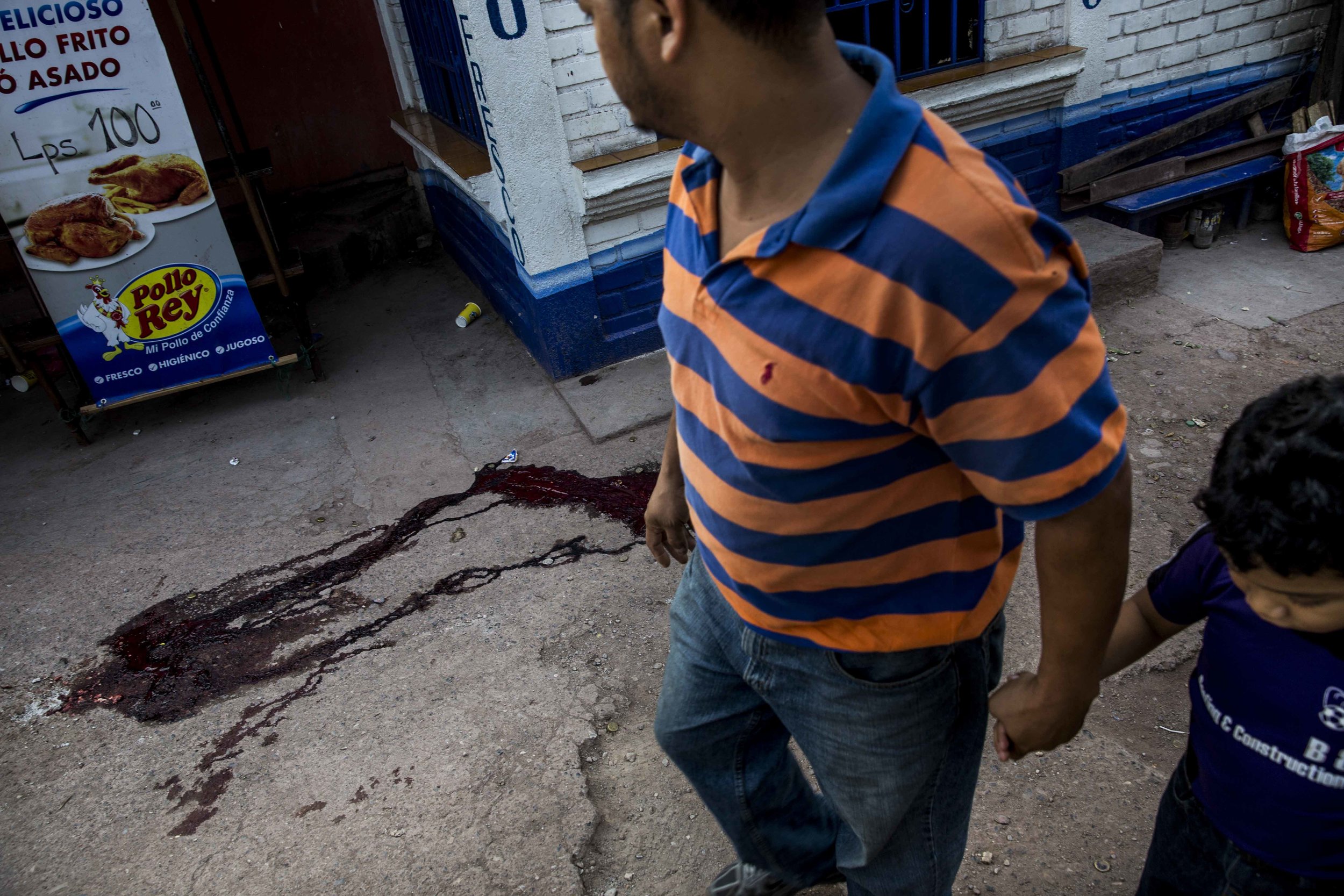
Father and son walk by next to the pool of blood left by the dead body of Edwin Amador, 20, murdered in cold blood in the streets of the Suyapa district, Teguciaglpa, capital of Honduras.
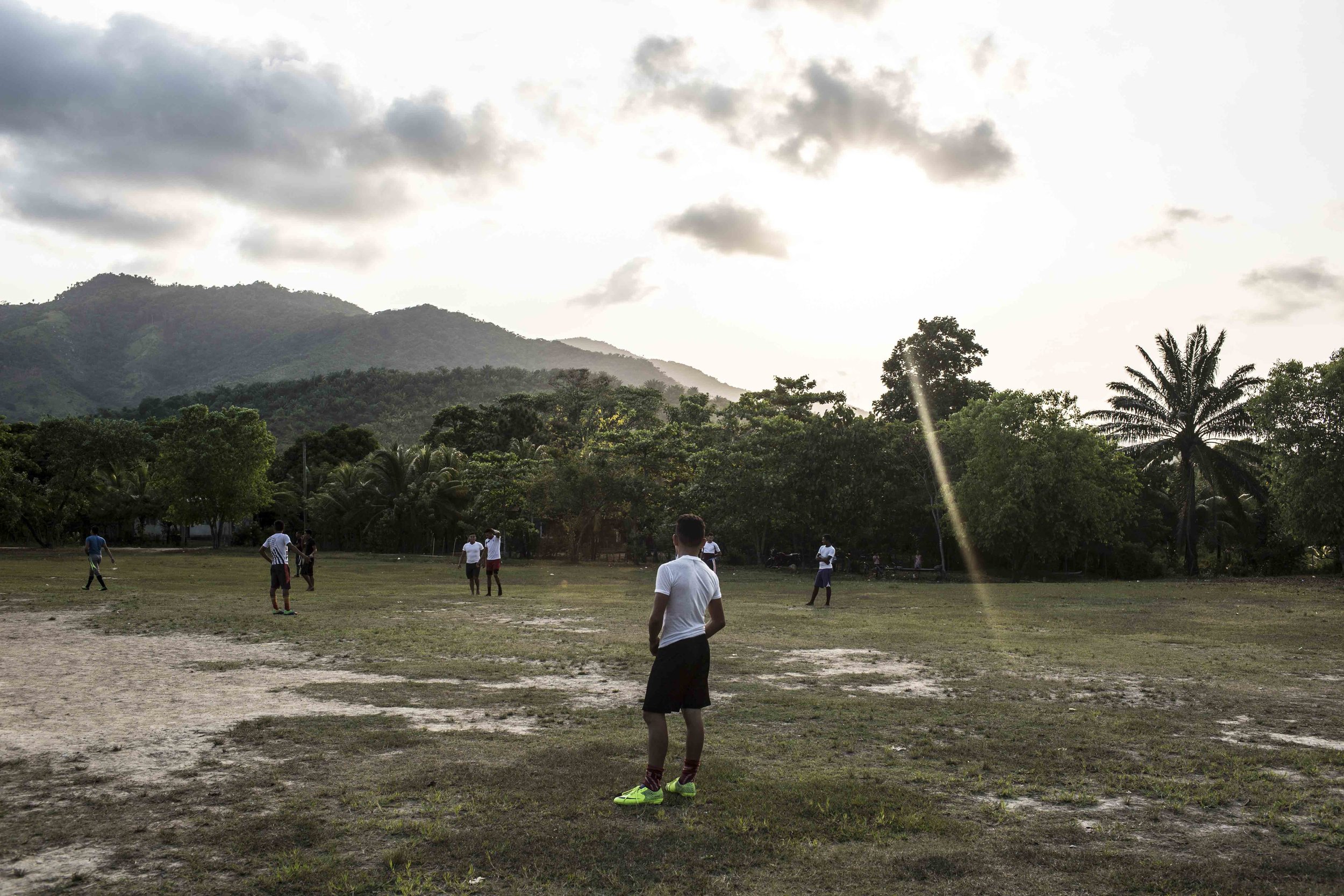
Young men in the football field of the Guadalupe Carney community, outside the city of Tocoa in the department of Colon, Aguan valley, on the Atlantic coast of Honduras. Insecurity in the Aguan valley has an active role in displacing people from their lands, especially young people and drive them to the major cities of Tegucigalpa and San Pedro Sula, where they often meet financial insecurity and end up join either Mara Salvatrucha (MS-13) and 18 Street Gang (M-18), the two most important street gangs in the city.
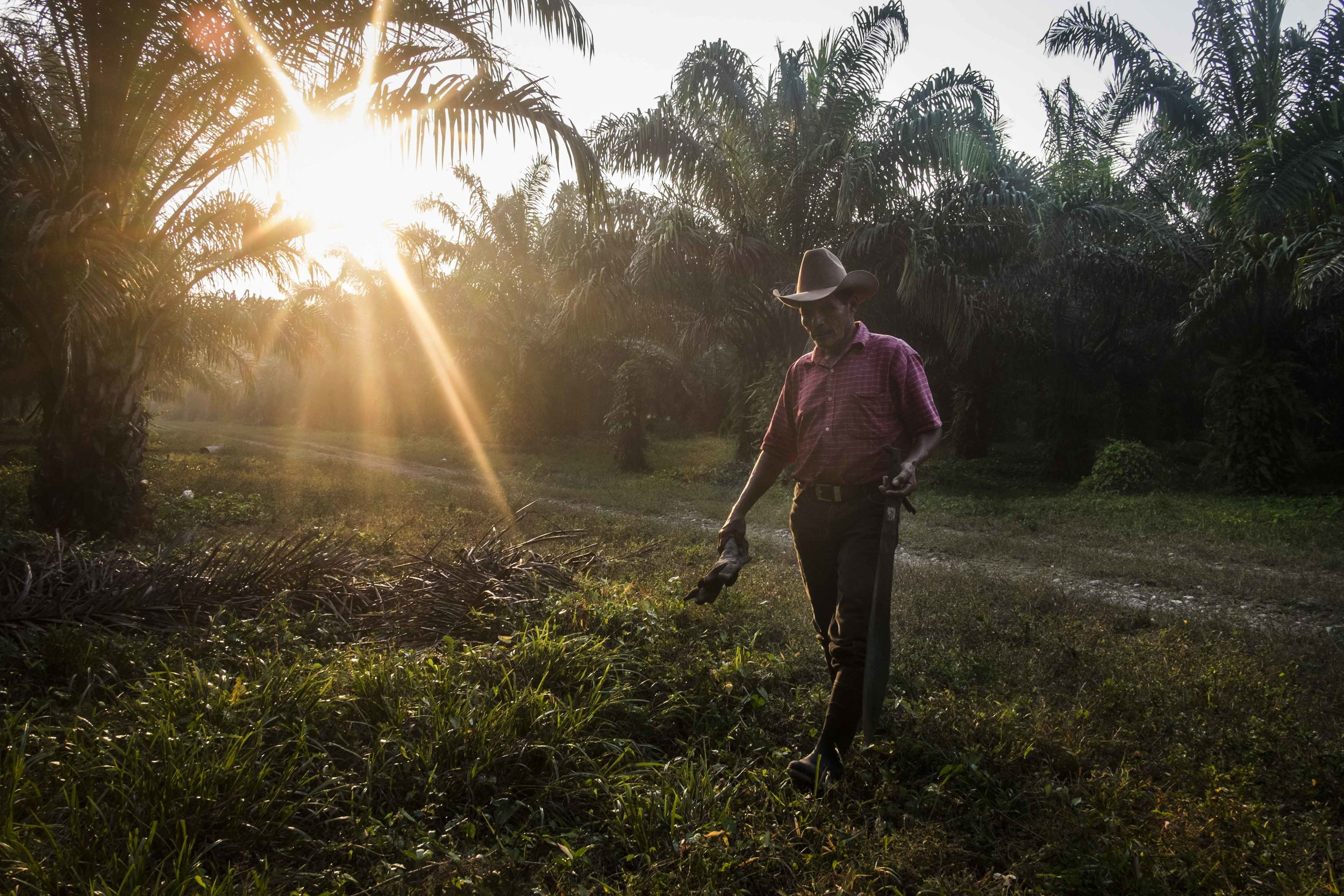
A peasant in African oil palm plantations in the Bajo Aguan region. Various farming communities who live in the valley of Bajo Aguan, on the Atlantic coast of Honduras, suffer repression and live in a situation of violence with a high level of murders among peasants, especially after the coup of 1999. That has effectively decreed a very serious situation in terms of agrarian conflict, the most violent in the last fifteen years of the history of violence against peasants in Central America.
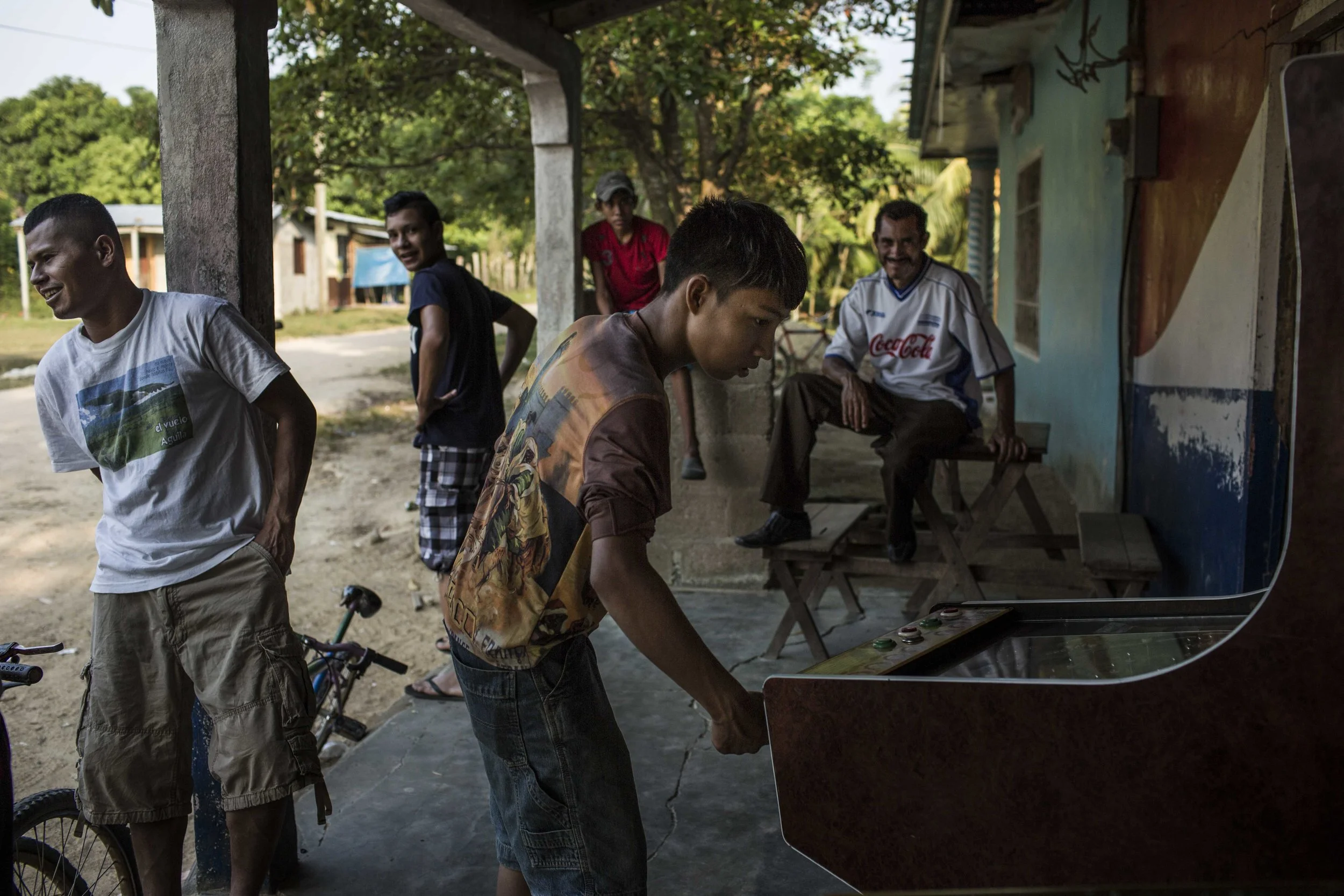
Boys in their community, outside the city of Tocoa in the department of Colon, in the Aguàn valley on the Atlantic coast of Honduras. UN Office on Drugs and Crime reported that drug traffickers in the Aguàn region allegedly contracted member of a gang denominated Mara 61 to defend their operations in the area.
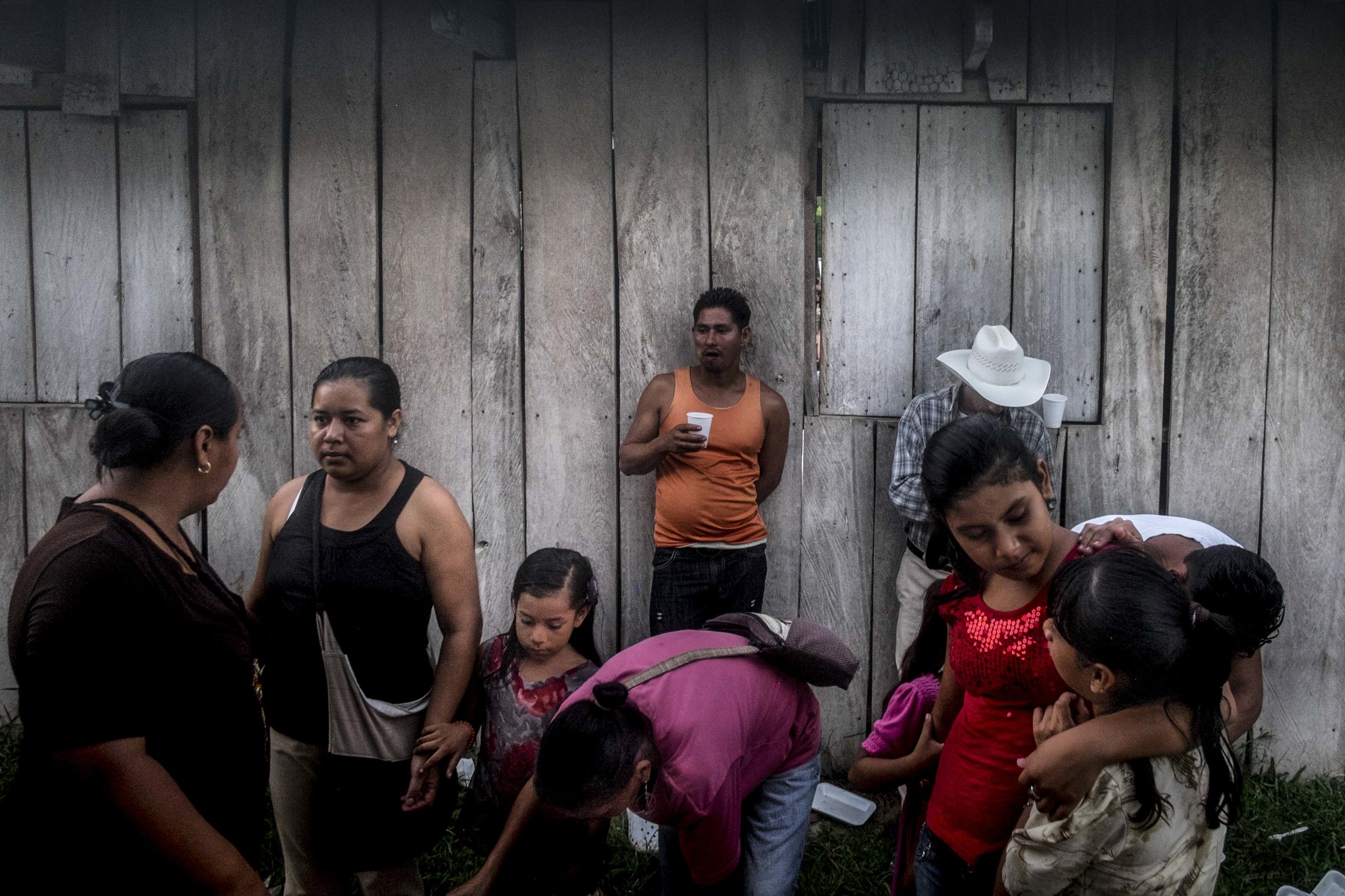
Members of the Guadalupe Carney community, outside the city of Tocoa in the department of Colon, Aguan Valley, Honduras. In some rural areas of the country, things are quite and murder and violence is considered a city problem. In others, like the Aguan Valley where state security forces as well as US forces have been deployed with the purpose of fighting against drug trafficking, the sensation of war is present.
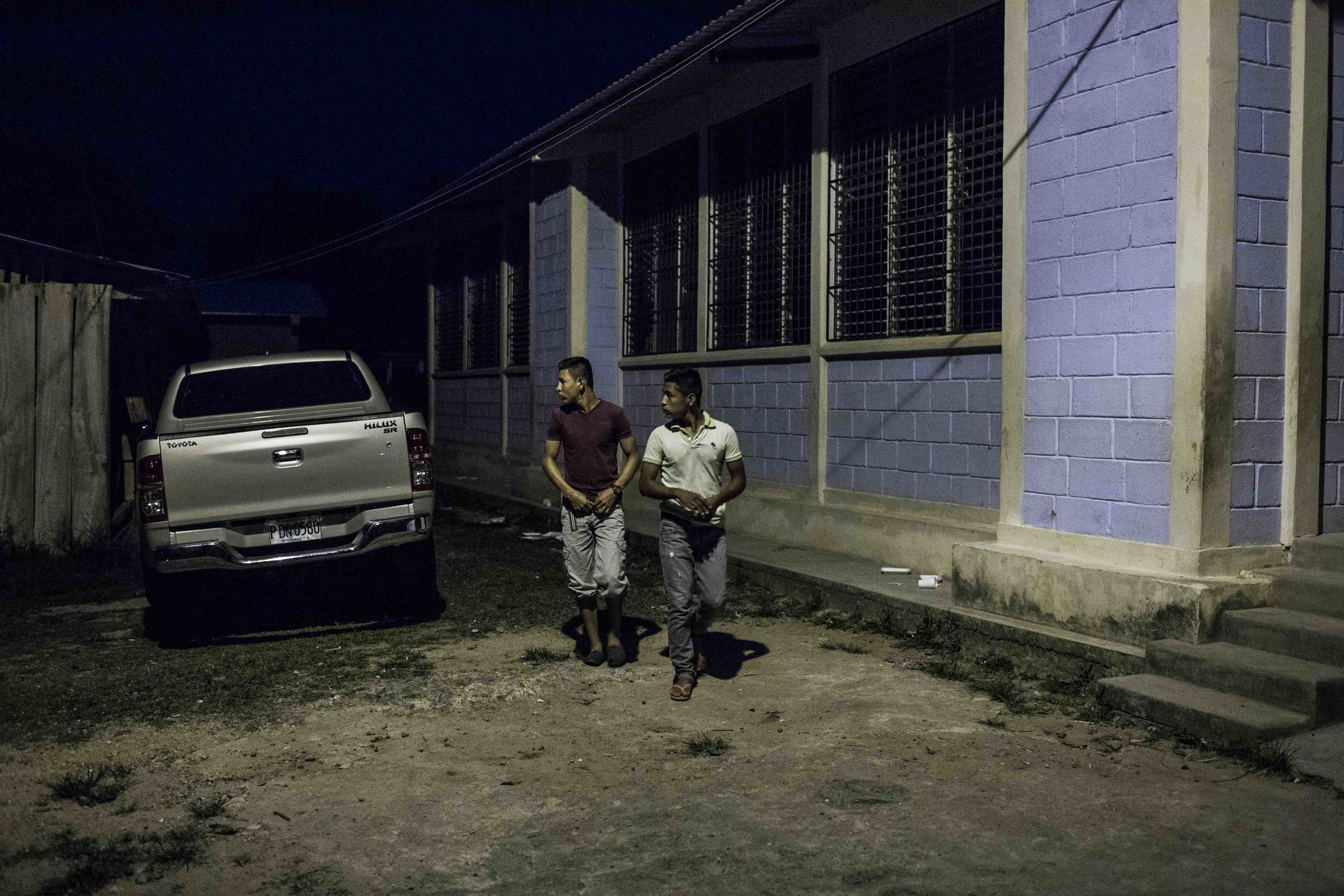
Young men in the football field of the Guadalupe Carney community, outside the city of Tocoa in the department of Colon, Aguan valley, on the Atlantic coast of Honduras. Insecurity in the Aguan valley has an active role in displacing people from their lands, especially young people and drive them to the major cities of Tegucigalpa and San Pedro Sula, where they often meet financial insecurity and end up join either Mara Salvatrucha (MS-13) and 18 Street Gang (M-18), the two most important street gangs in the city.
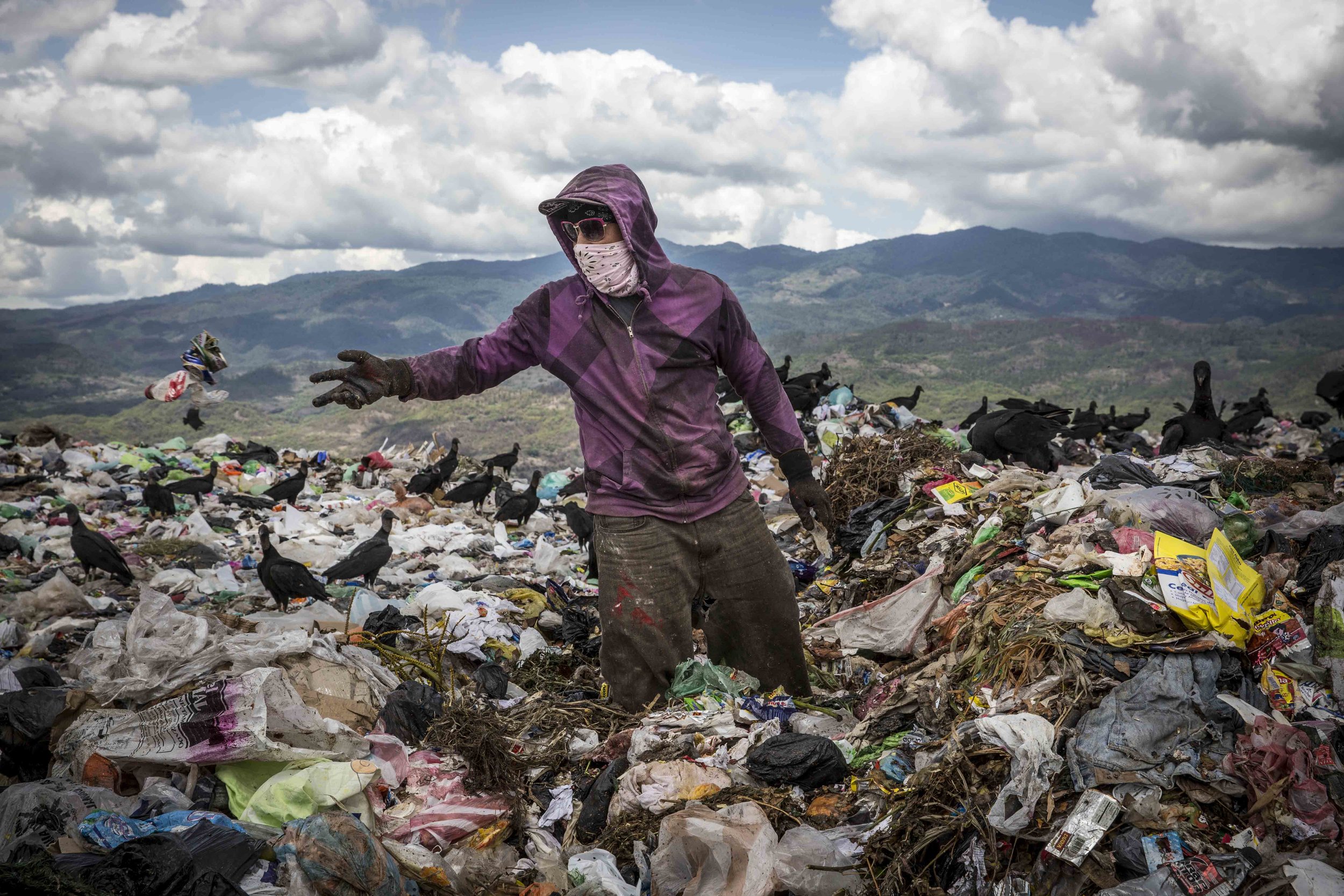
A boy searches for plastic material, in the main landfill in Tegucigalpa, which is under control of the local gangs. Everything is then sold for a few US dollars and in this way many make their living.
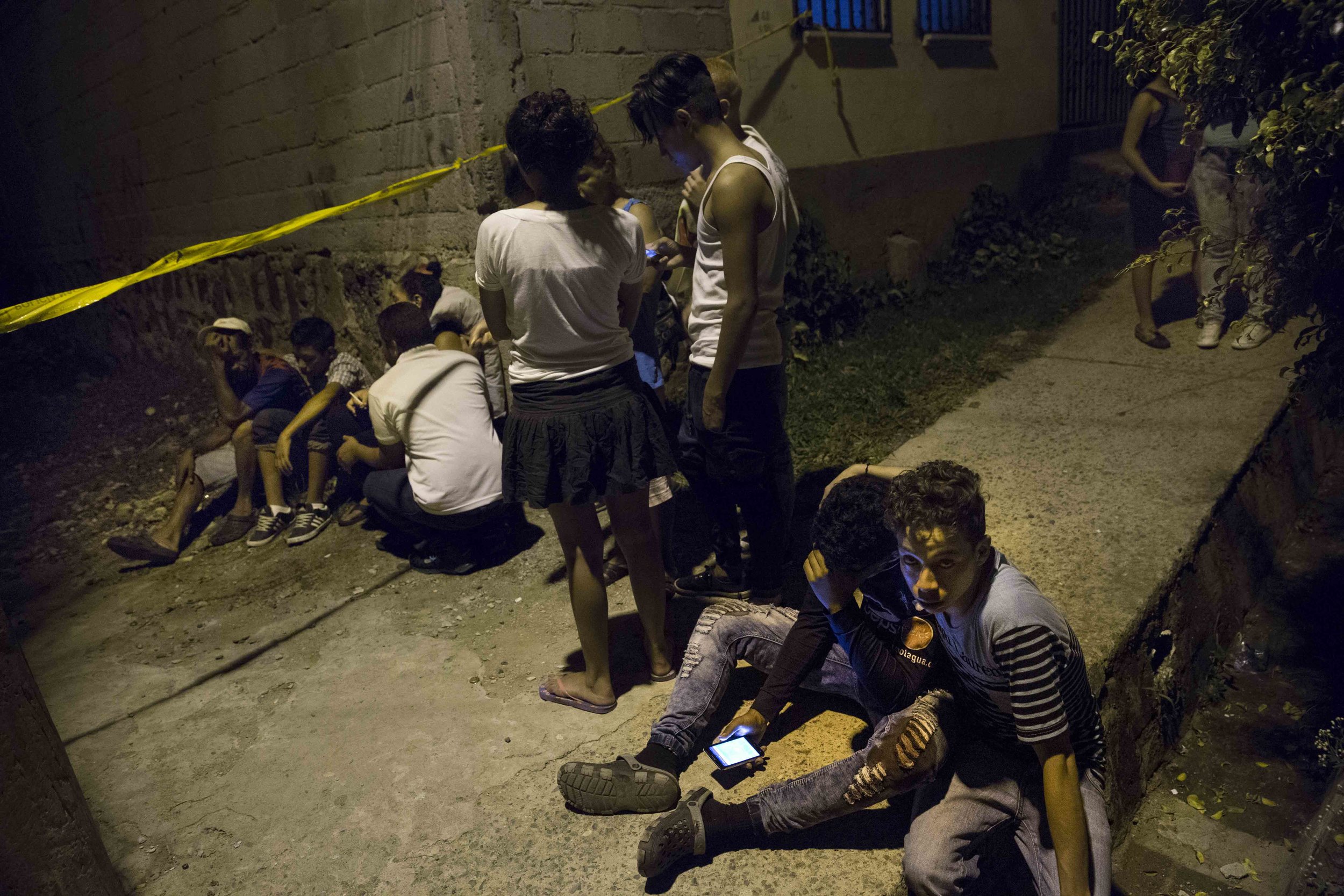
The family of a boy murdered in a Tegucigalpa neighborhood, awaits the arrival of forensic crime scene.
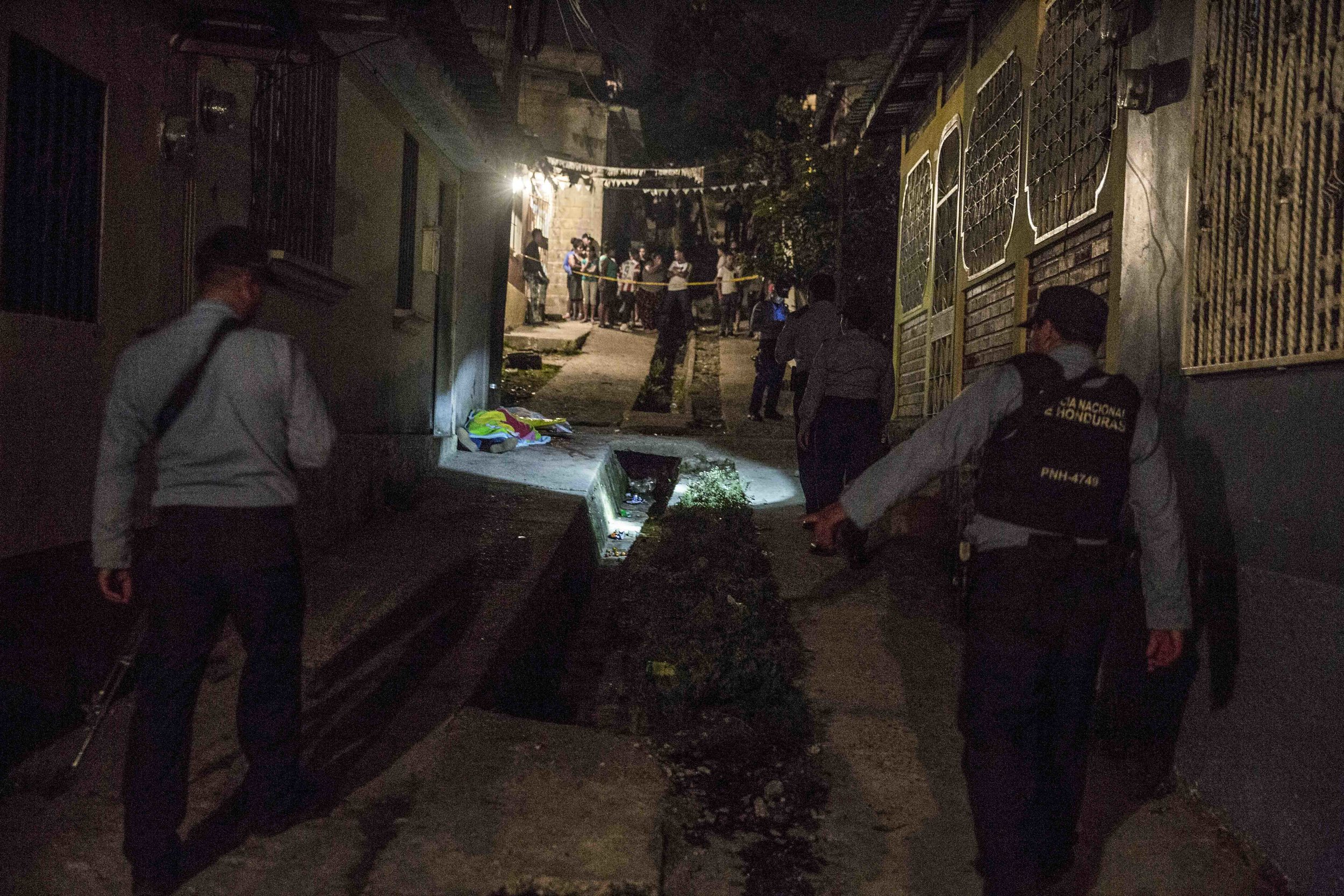
Honduran police officers guard the corpse of a woman, who was killed along with three others and a boy, apparently as a result of drug-related issues, in one of the districts of the capital Tegucigalpa.
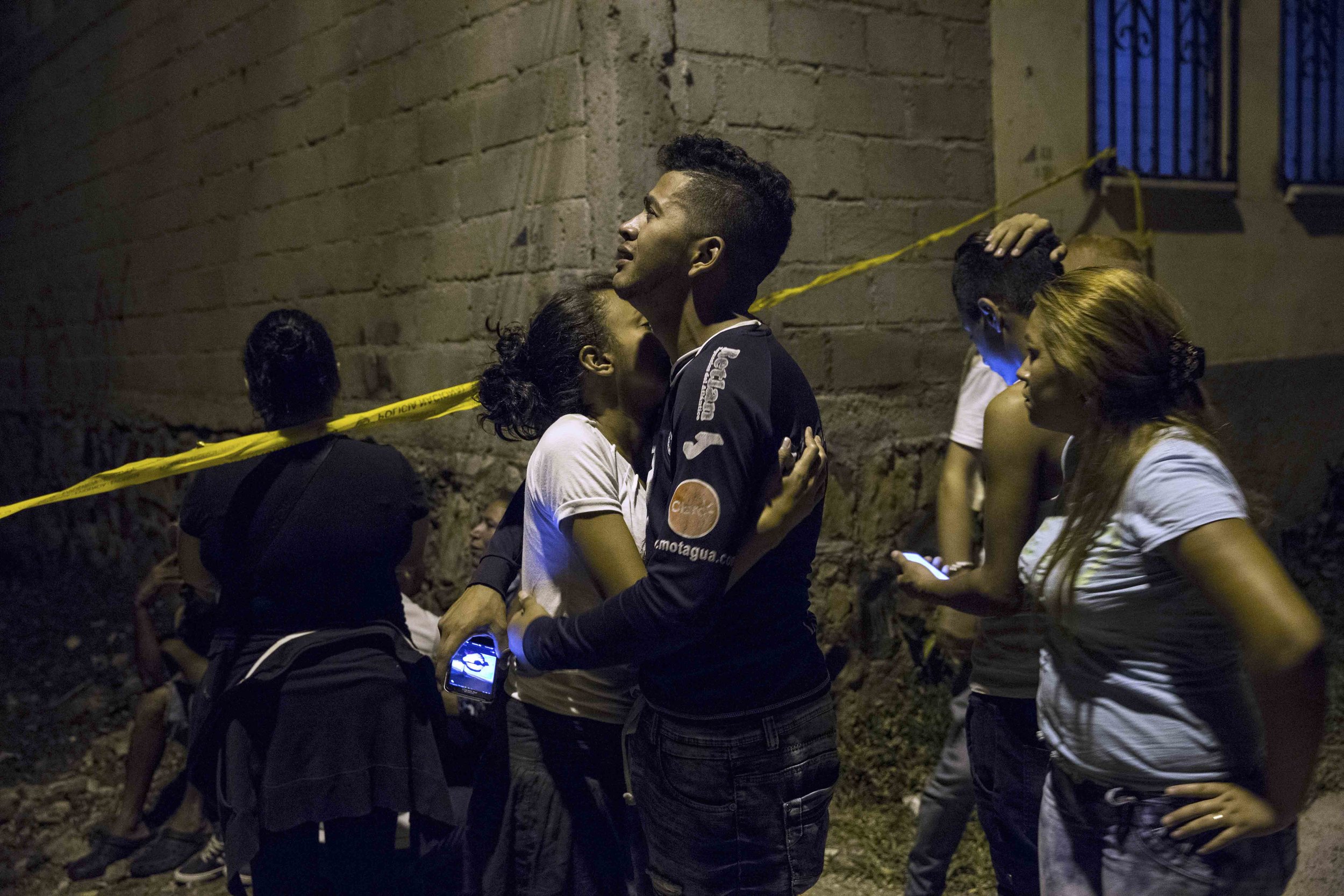
A boy mourns his brother, assassinated in a neighborhood, of Tegucigalpa, capital of Honduras.
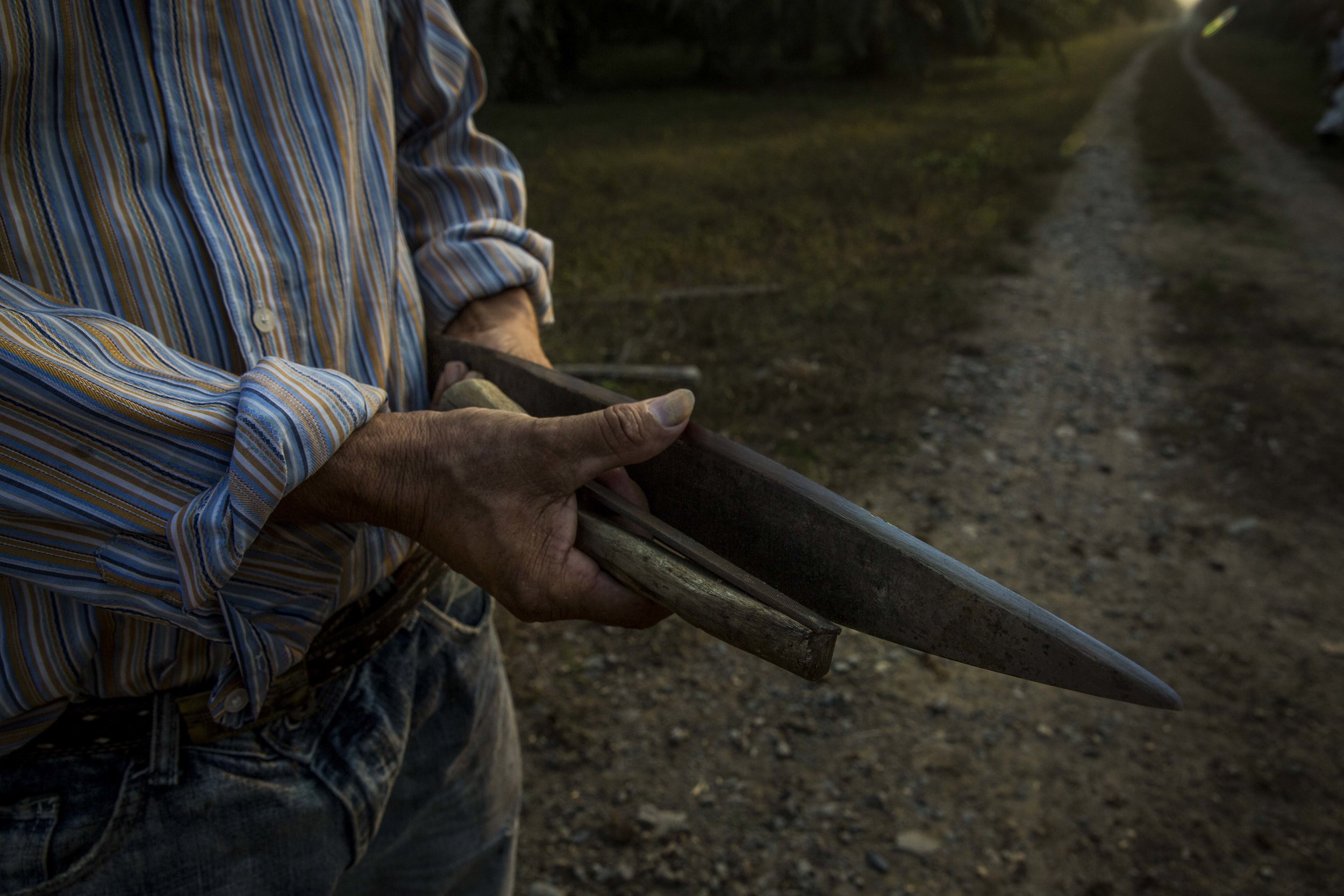
The pressure that violence in the countrysides puts on the locals is intense and many have to flee, either abroad or to the major cities, Tegucigalpa and San Pedro Sula.
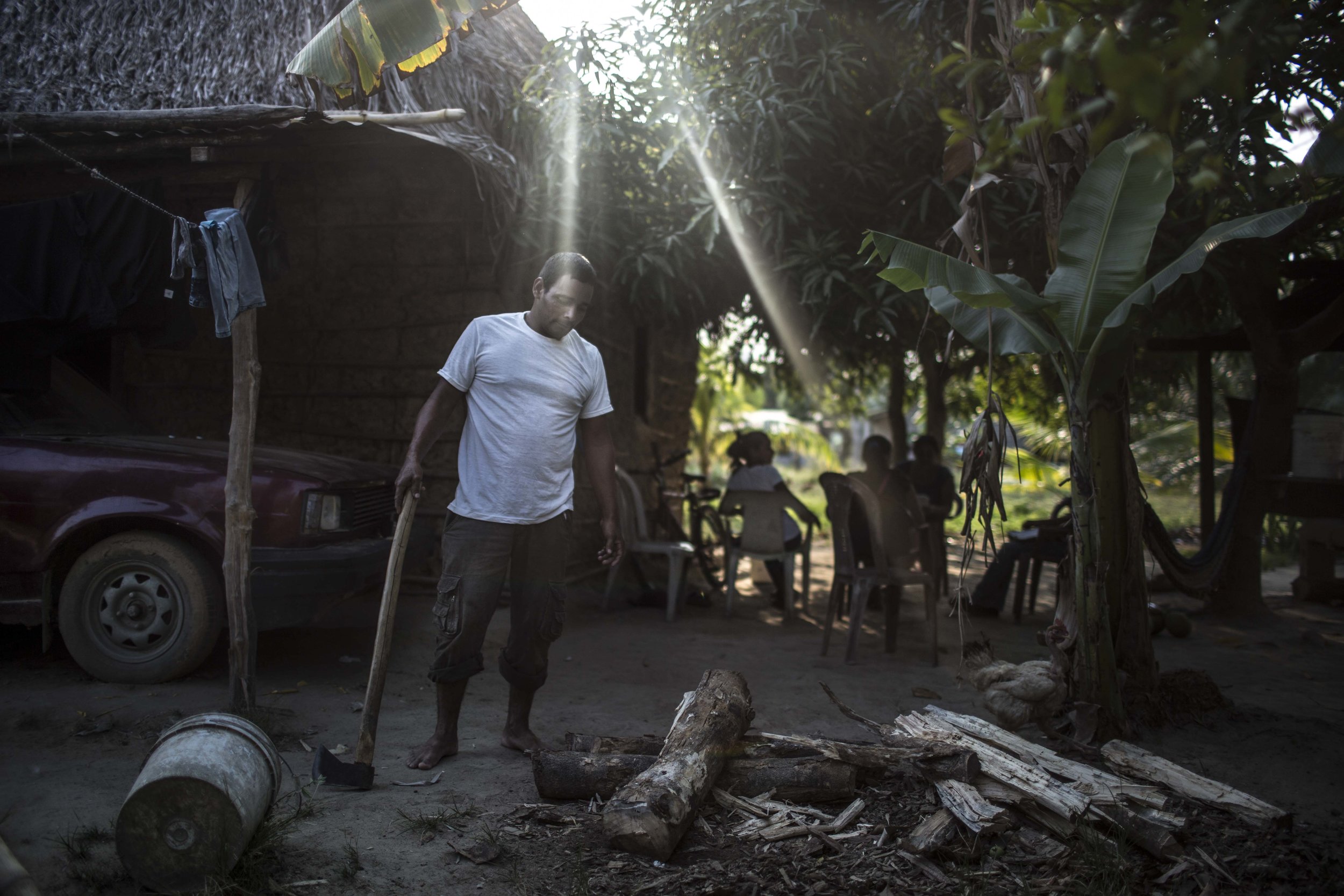
A man in front of his house in the campesino community of Guadalupe Carney in Aguán region, not far from the city of Tocoa in the department of Colon, on the Atlantic coast of Honduras. Community members denounce intimidations by private security forces in the area, in response to the peasants fights for land property and usage. About 60 percent of the palm oil exported from Honduras comes from this region.
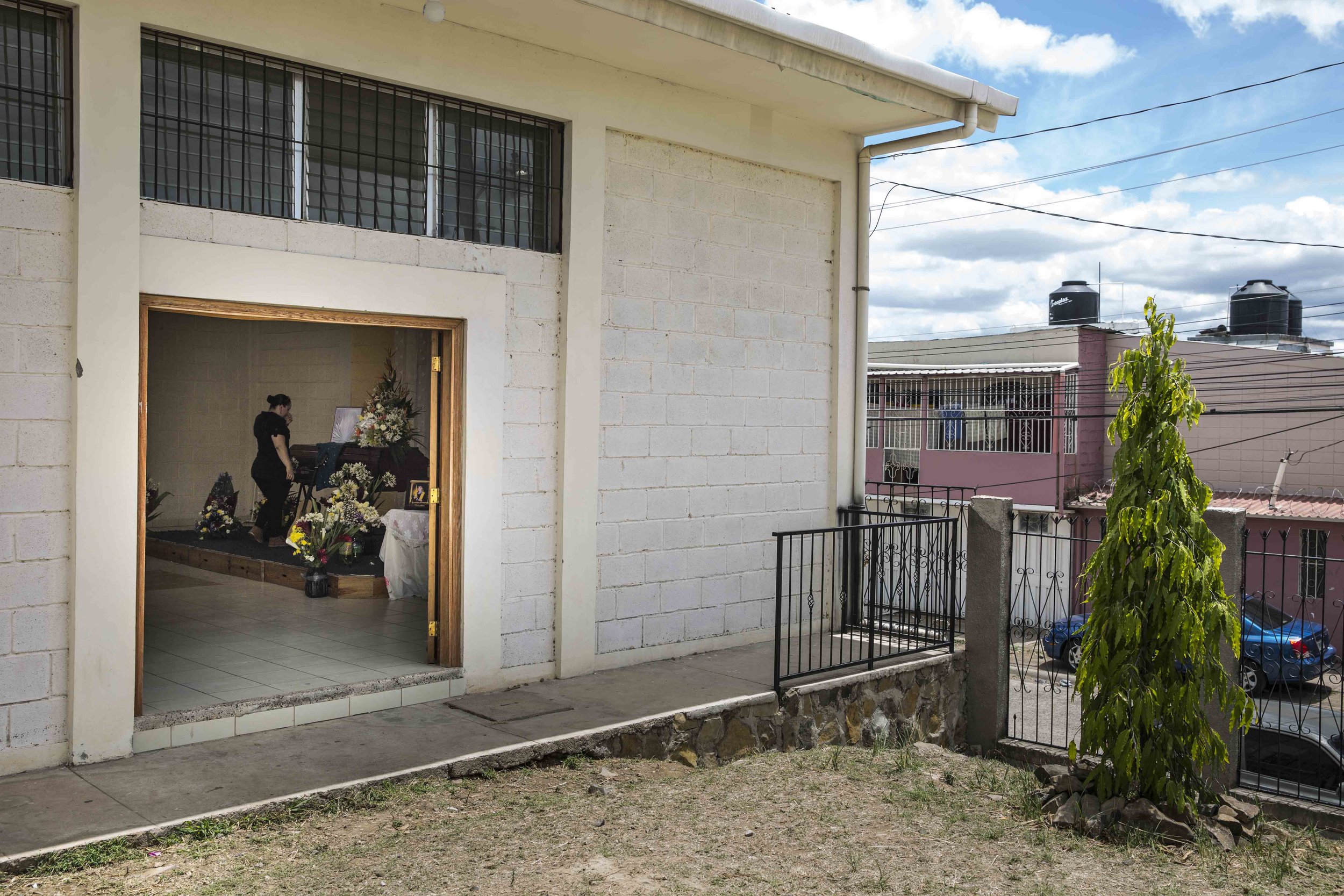
Relatives and friends of a boy murdered in the street a few days earlier, pay homage to the funeral held in a church building, a few steps from the place of the murder, in one of the most dangerous neighborhoods of the capital Tegucigalpa.
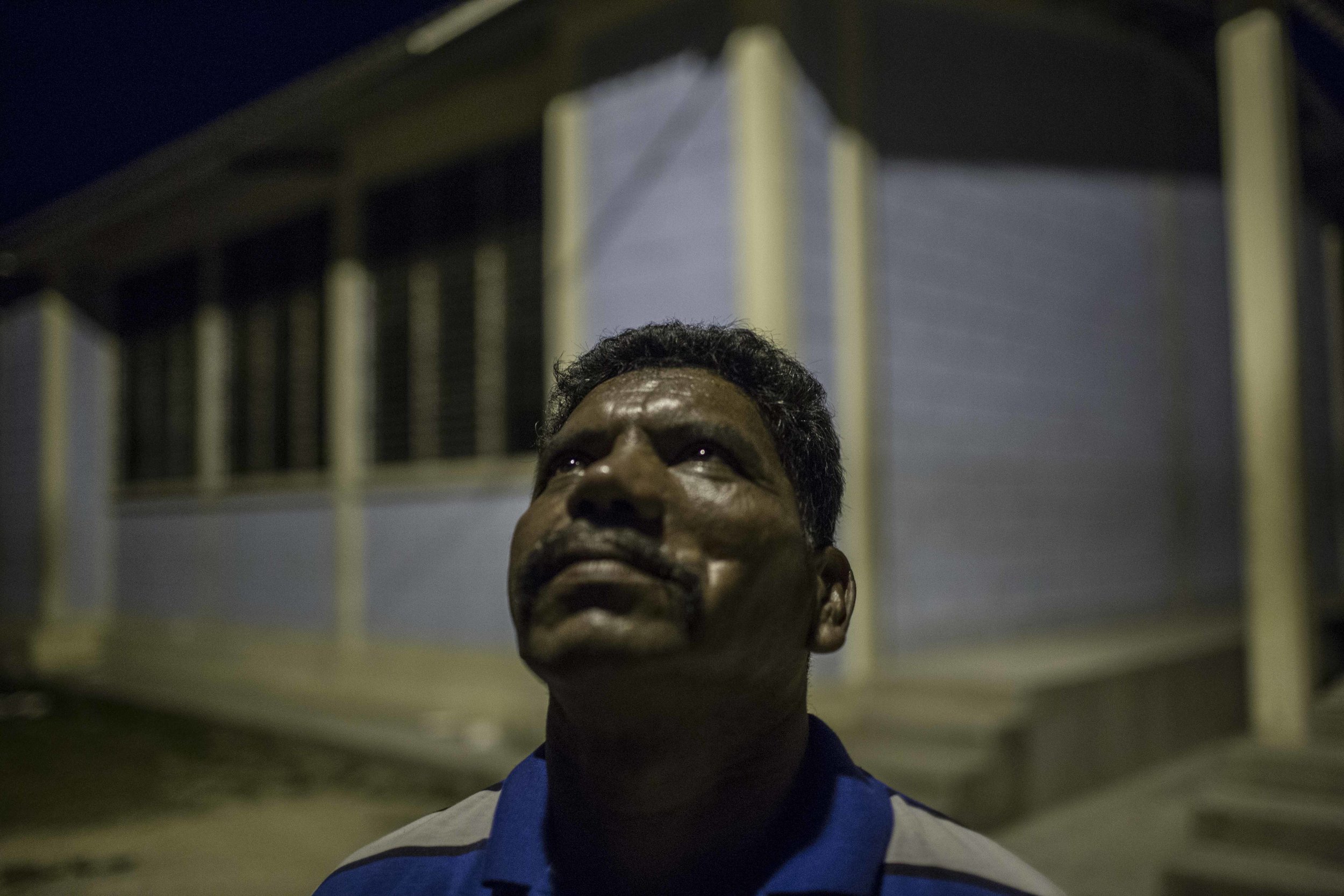
Francisco Ramirez, in the Guadalupe Carney community, belongs to the Aguán peasant organization. Francisco works in oil palm plantations. He and other farmers families have occupied a land that had been granted to them through the governmental agrarian reform but was later privatized. For two months they resisted occupying the ground before being evicted. They tried to go back, and felt into an ambush of the private security armed forces protecting the land. There were five deaths, and Francisco was hit by a bullet in the face, that tore the teeth and gum.
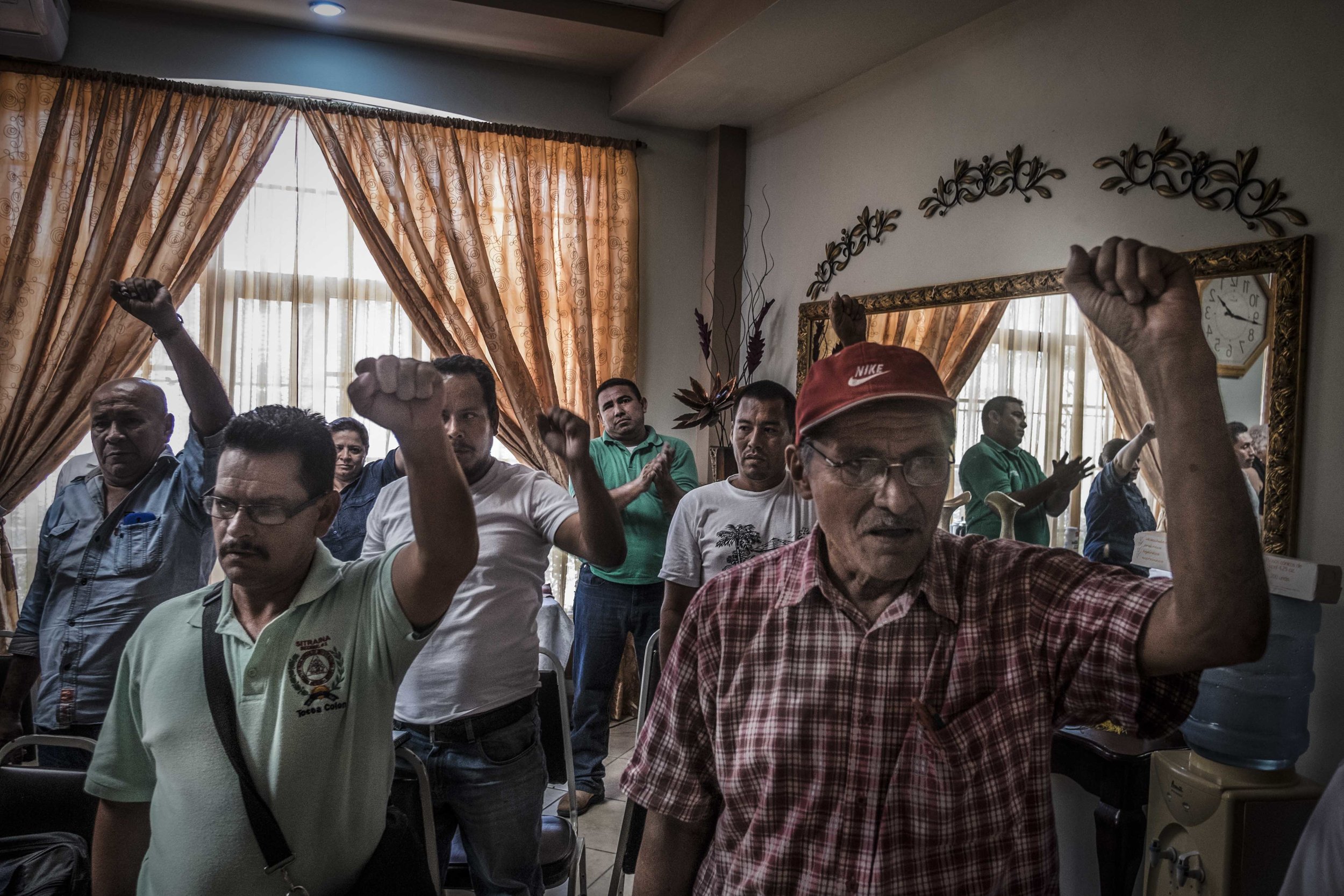
Representatives of the peasants organizations of men and women working in the African oil palm plantations in the Colon department, Aguan region, during assembly. It is not uncommon to see civilians bearing arms in Honduras, nor it is illegal, but in the Colon department a new law introduced in 2011 prevents the carrying of weapons, but doesn't apply to police soldiers or private security guards.
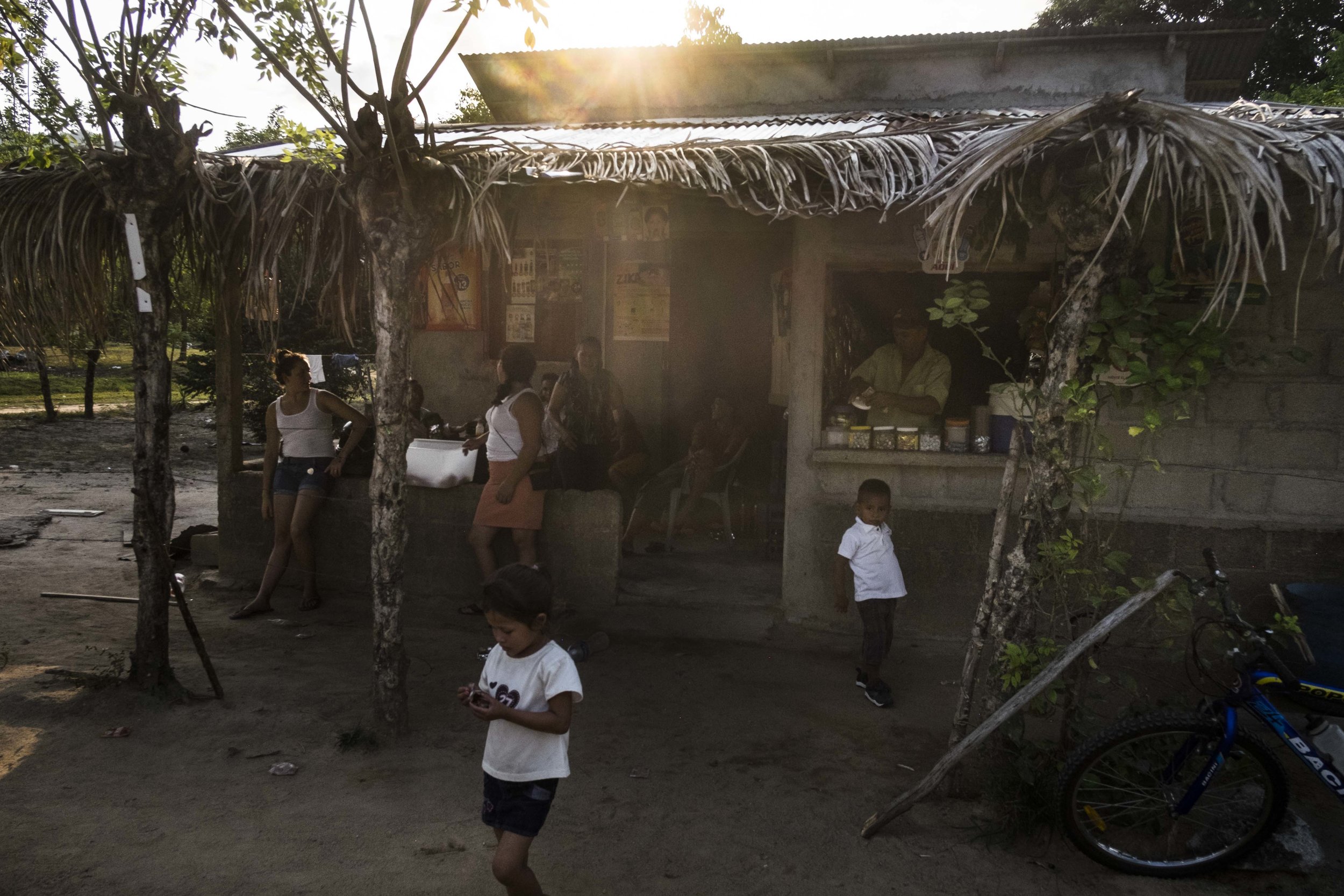
Family in the Guadalupe Carney community, outside the city of Tocoa in the department of Colon, Aguan valley, Honduras. Insecurity in the Aguan valley has an active role in displacing people from their lands, and drive them to the major cities of Tegucigalpa and San Pedro Sula.
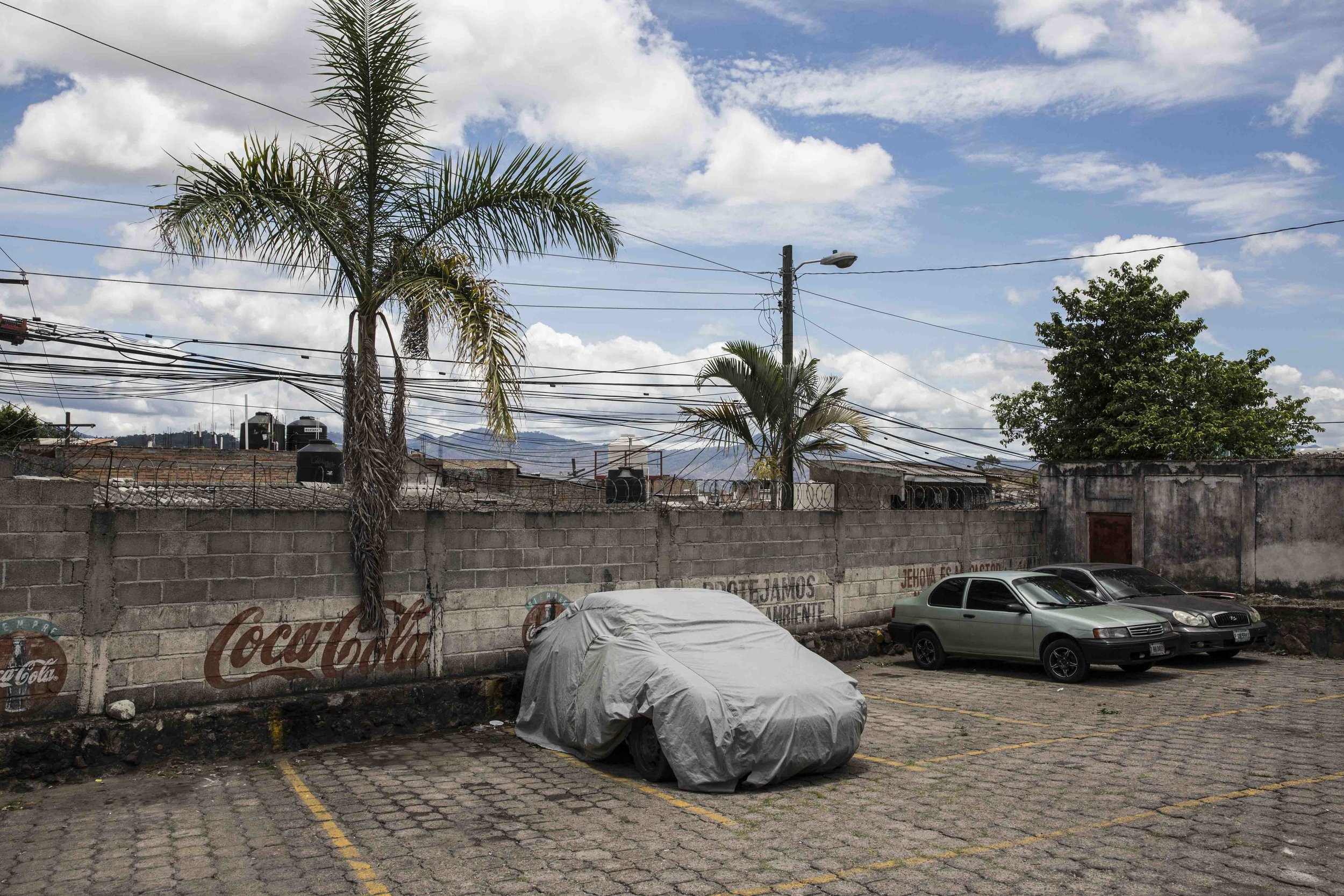
On the streets of Suyapa, one of the most dangerous neighborhoods of Tegucigalpa.
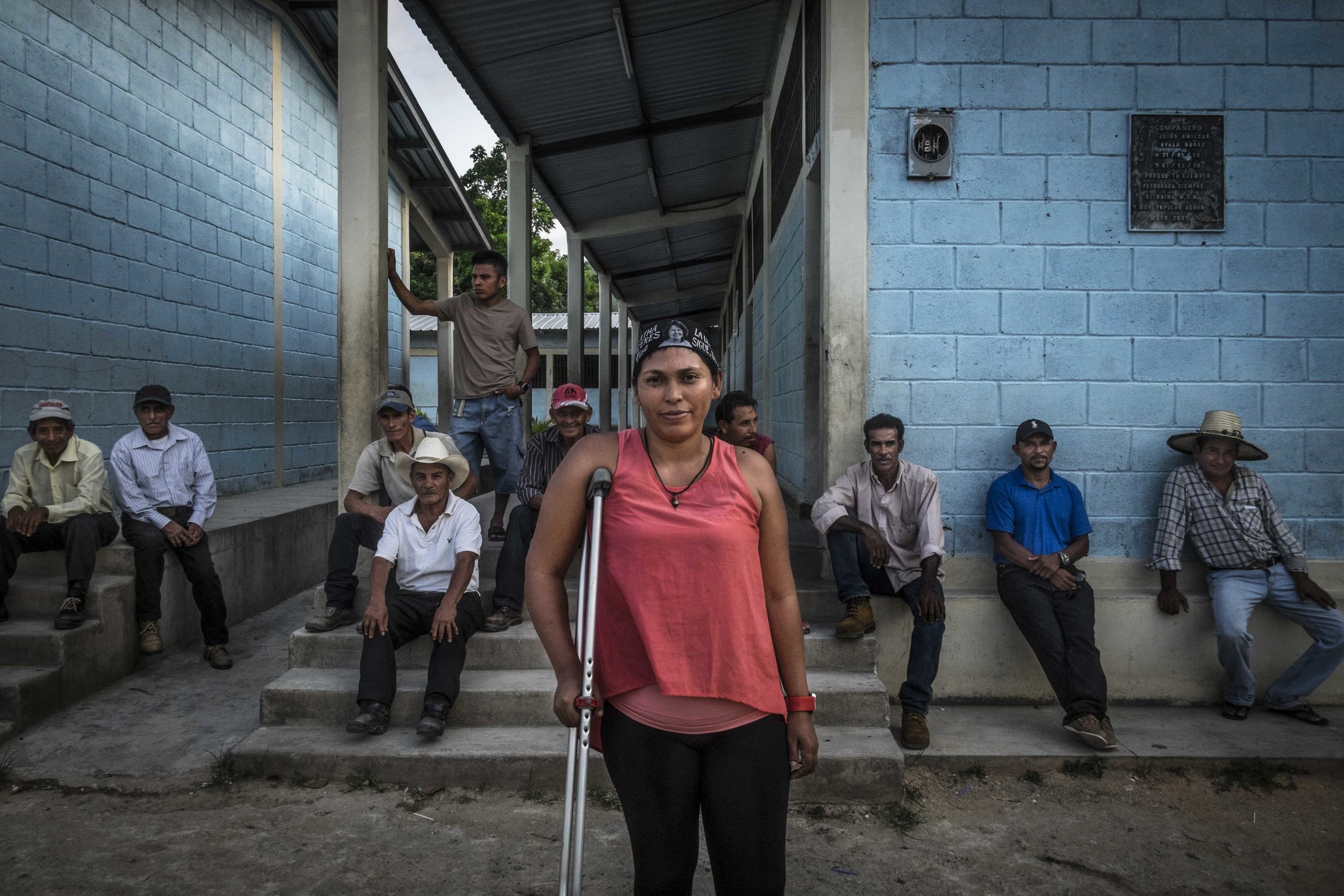
Lemus Irma Amaya, along with members of the small community Guadalupe Carney, outside the city of Tocoa in the department of Colon, Honduras. Irma is the coordinator of (OPDHA) Permanent Observatory of human rights in the Bajo Aguan, representative of the peasants' movement, she was wounded during an assassination attempt against her November 19, 2015 while traveling by motorcycle with his partner who was also a defender of peasants rights , he had suffered an assasination attack a week before Irma.
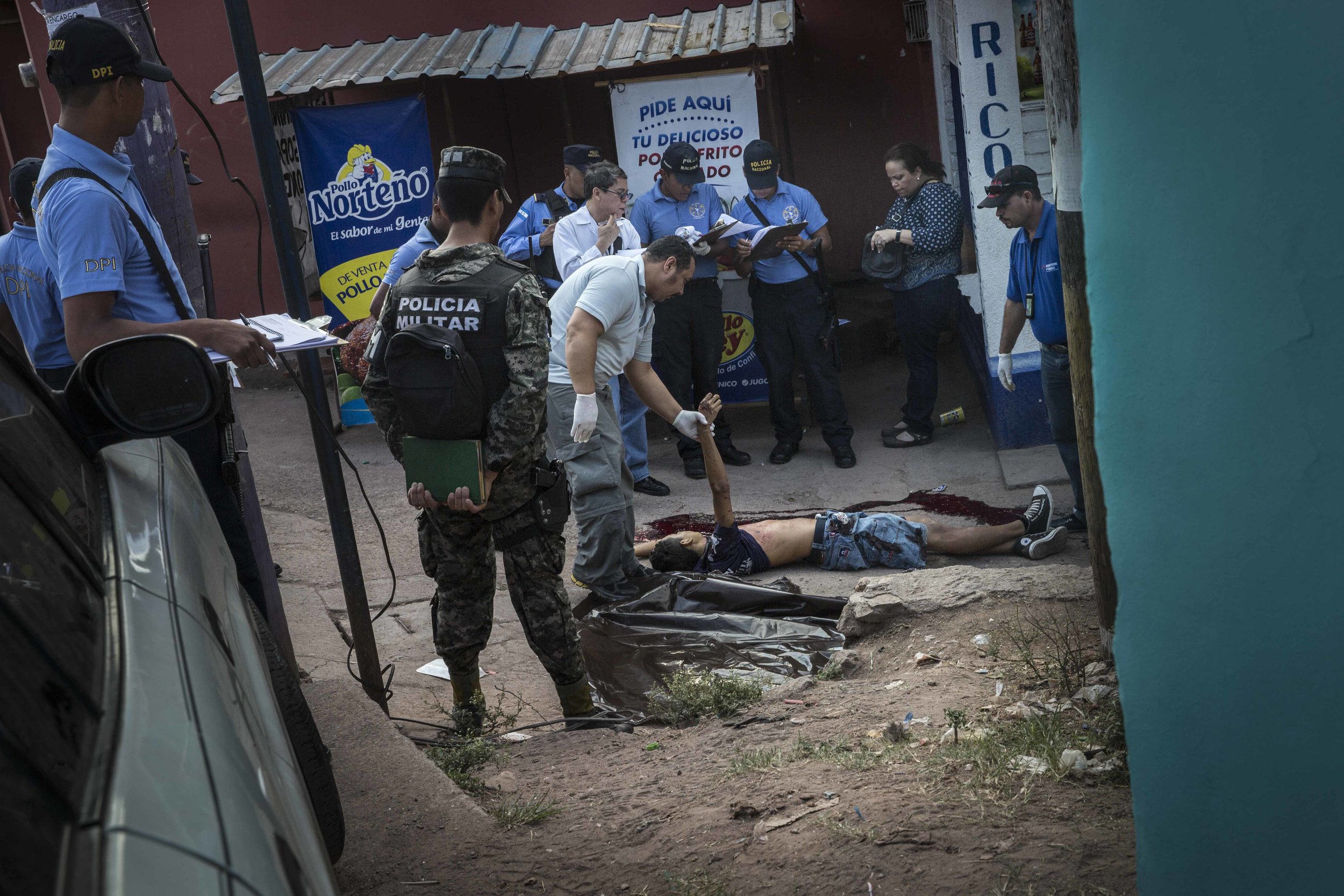
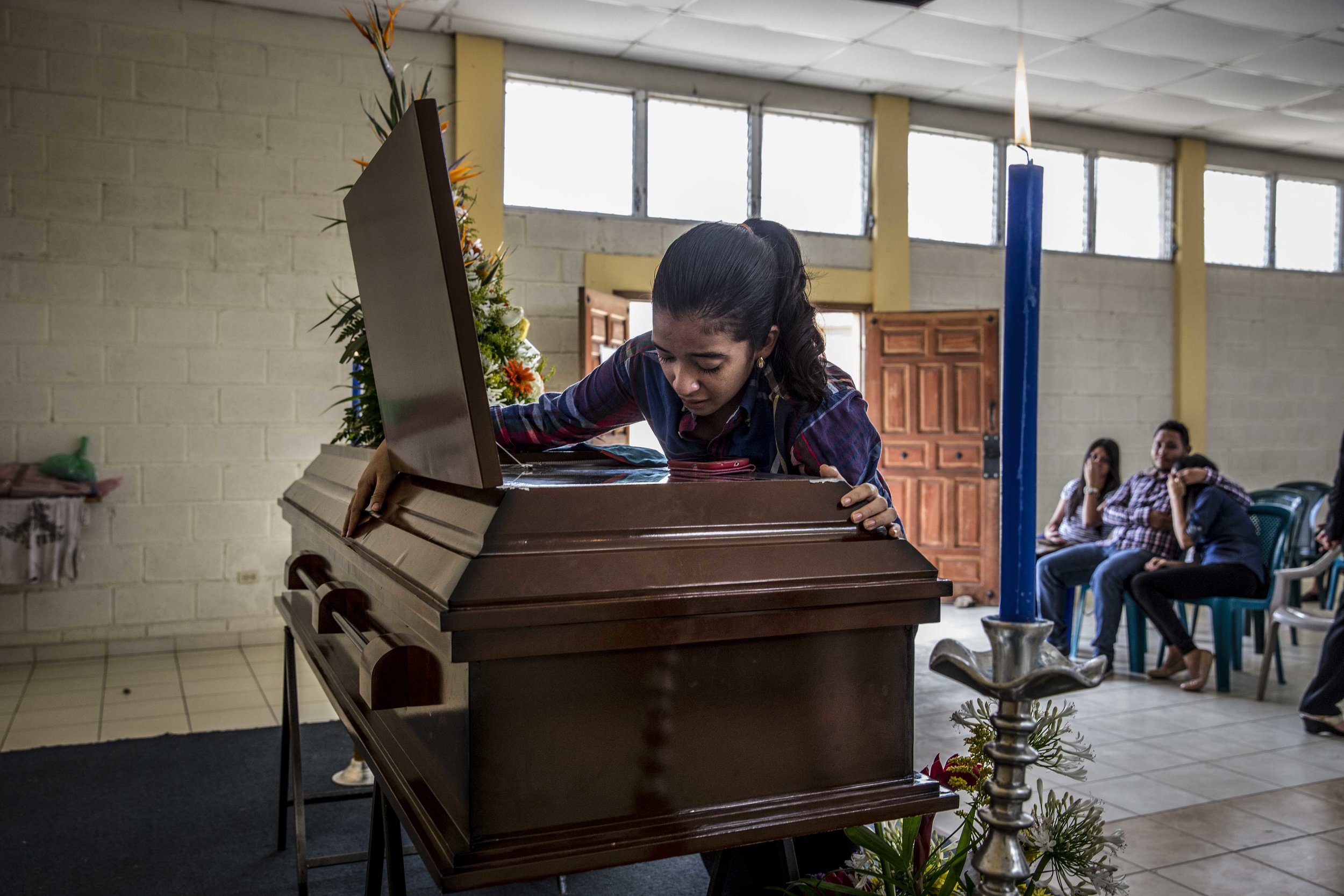
Relatives and friends of a boy murdered in the street a few days earlier, pay homage to him at his funeral held in a church building a few steps from the place of the murder, in one of the most dangerous neighborhoods of the capital Tegucigalpa, Honduras. The boy had just started college and according to the relatives, he did not belong to any street gang.
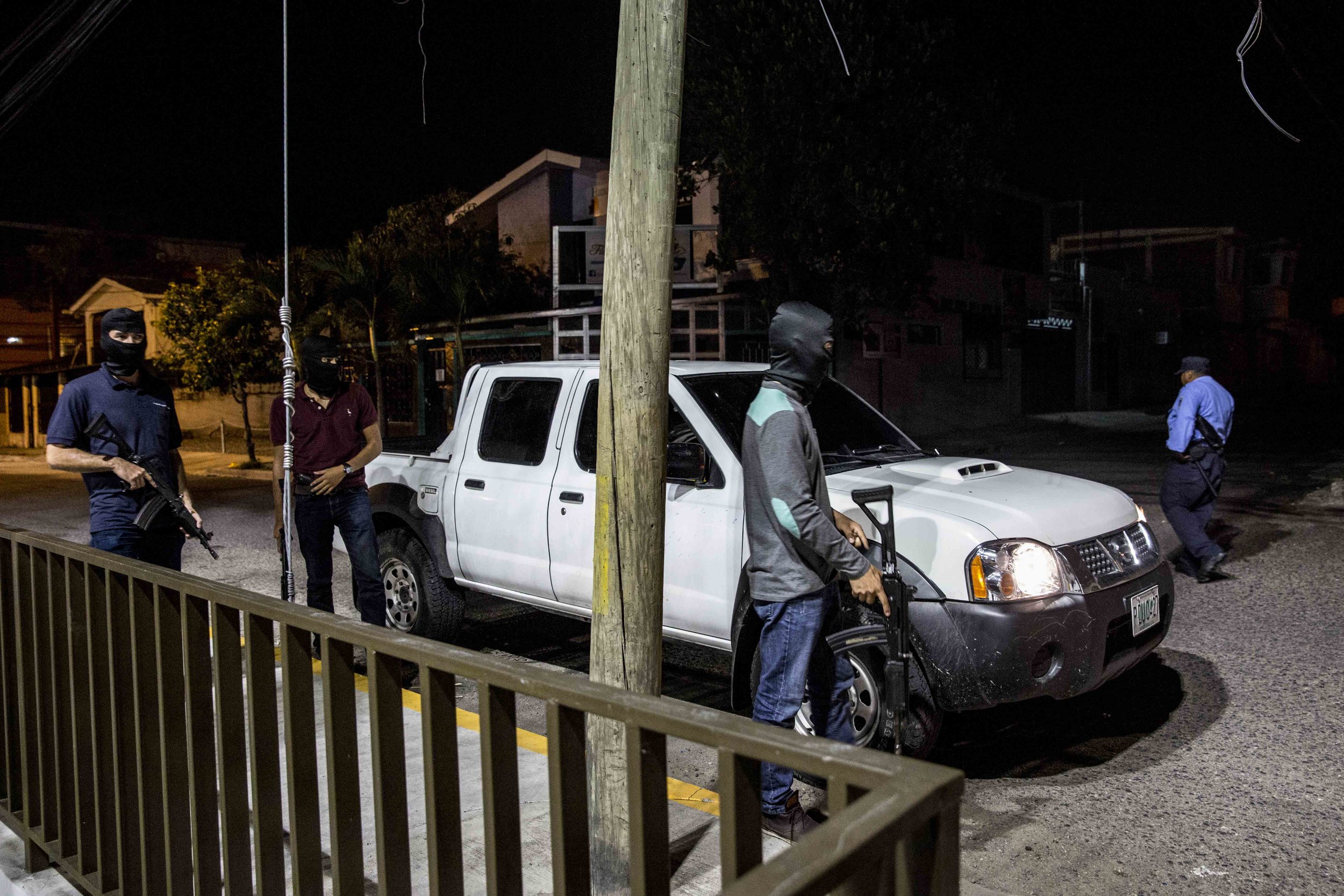
Police armed men, guarding the area where some weapons that are believed to have been used to massacre three women and a guy few hours before in the capital Tegucigalpa, Honduras.
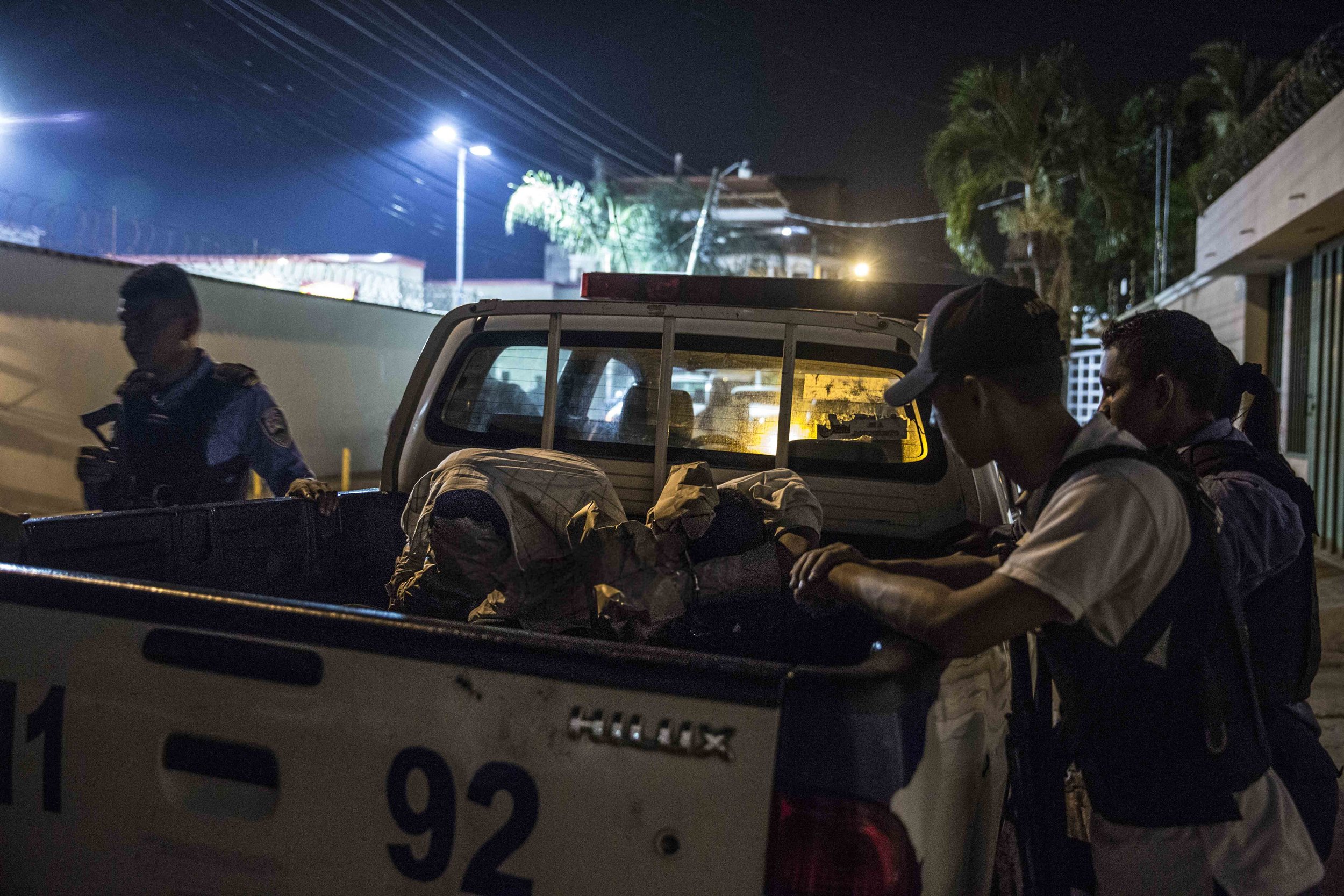
Two boys, suspected of the murder of three women and a boy a few hours before in a Tegucigalpa neighborhood, are held by the police to be later interrogated.
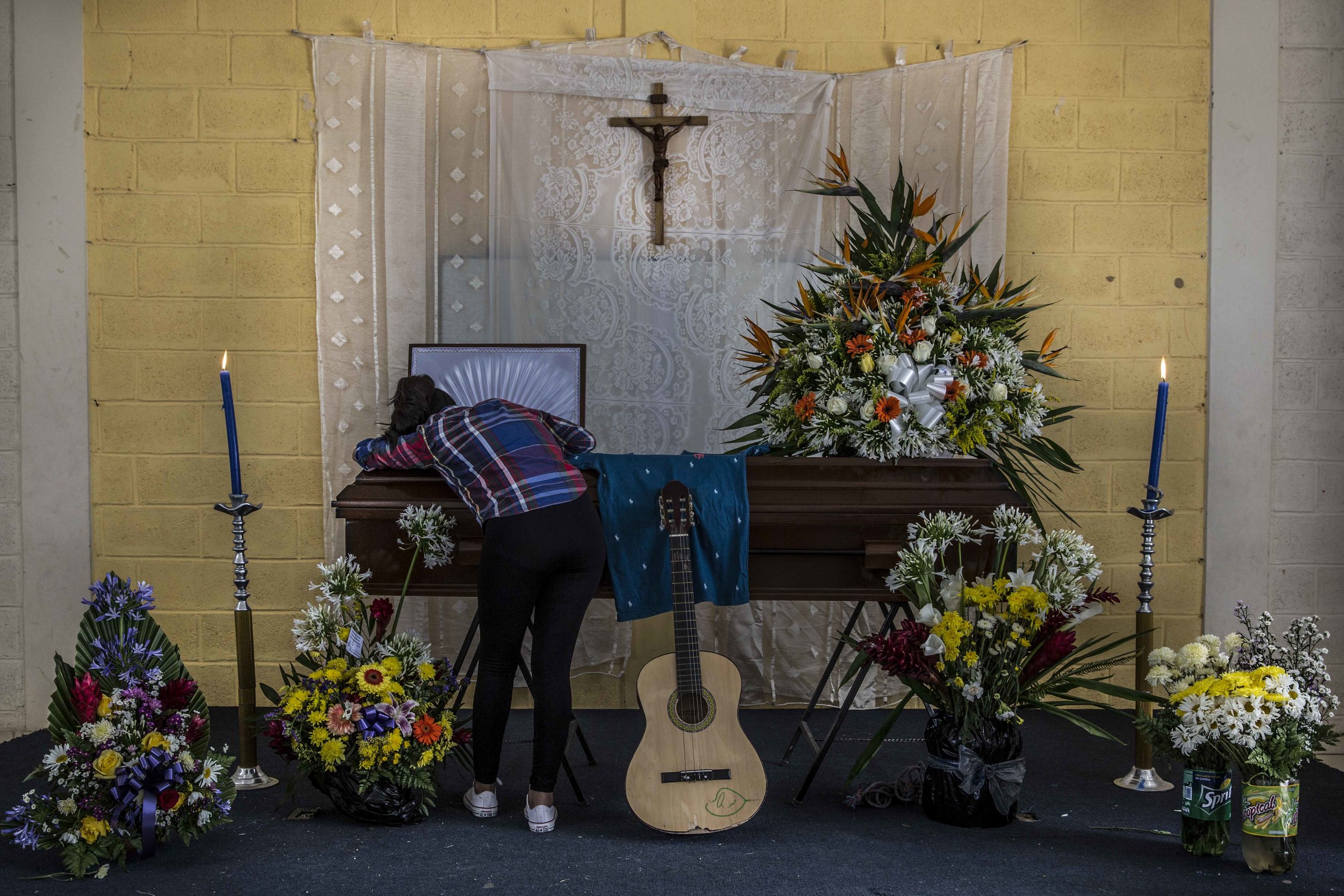
Relatives and friends of a boy murdered in the street a few days earlier, pay homage to him at his funeral held in a church building a few steps from the place of the murder, in one of the most dangerous neighborhoods of the capital Tegucigalpa, Honduras. The boy had just started college and according to the relatives, he did not belong to any street gang.
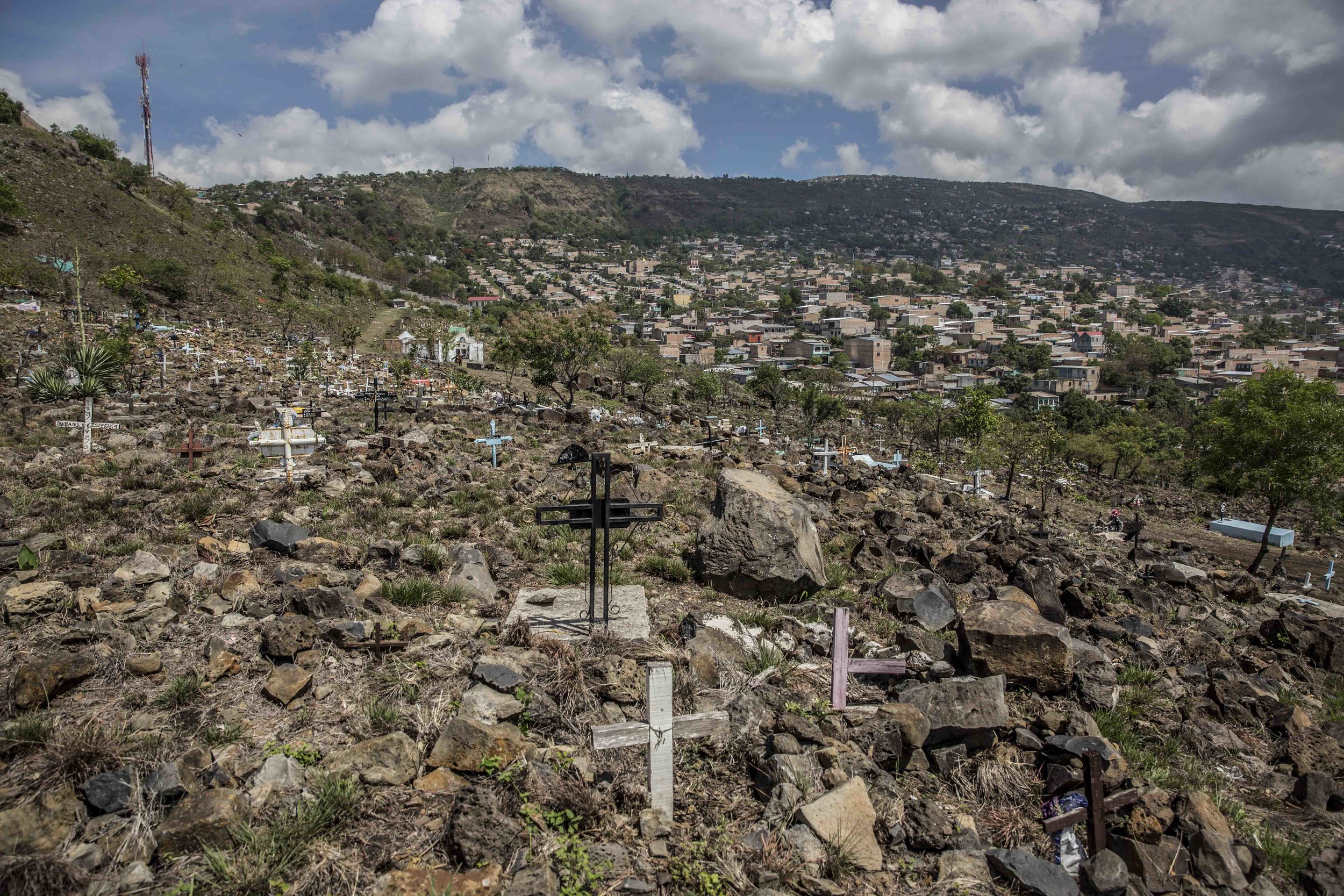
The cemetery in the settlement colony called "Divino Paraíso" (Divine Paradise) in the capital Tegucigalpa, one of the most dangerous neighborhoods because under control of M-18 street gang. In this cemetery many gang members are buried.
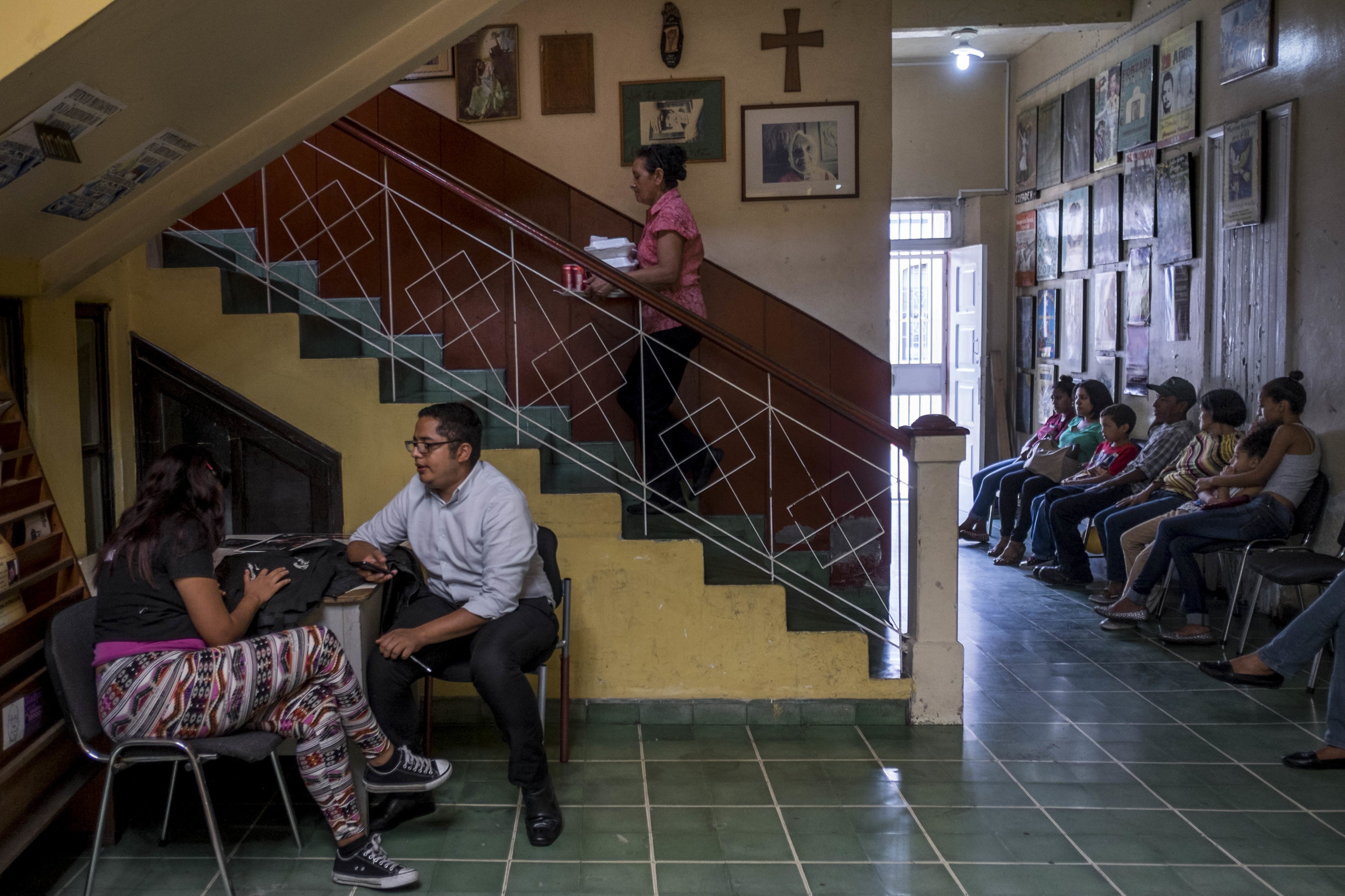
Inside the headquarters of COFADEH (Committee for Relatives of the Disappeared in Honduras), an organization that documents human rights violations, and works to help the relatives of victims of enforced disappearances and assassinations.
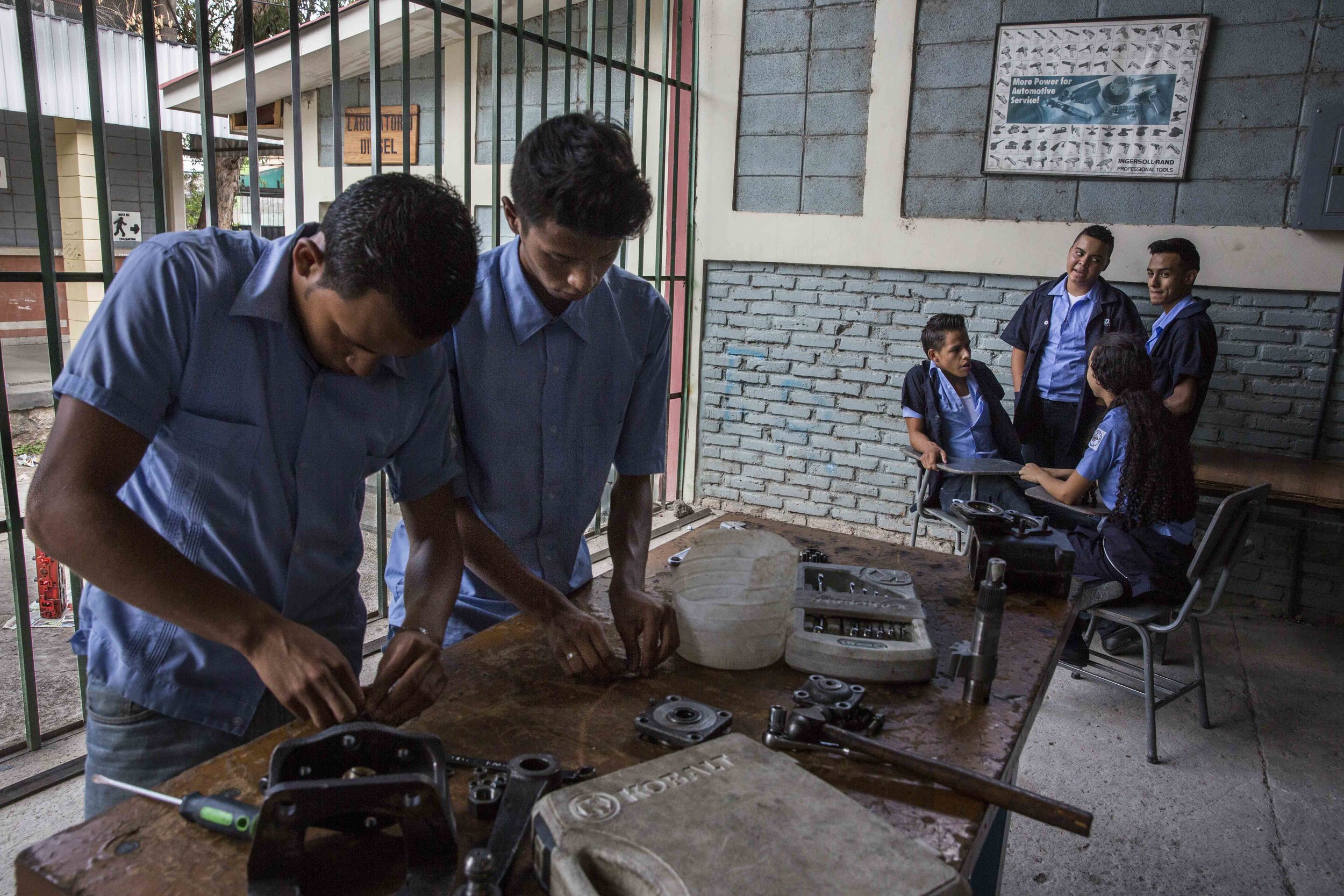
Boy and girls inside the premieres of a school in a vocational school of the capital Tegucigalpa. This neighborhood under the control of the 18 Street Gang (M-18). The M-18, it is also known as the army of the children, because of the age of the members, which are often recruited in schools like this one.
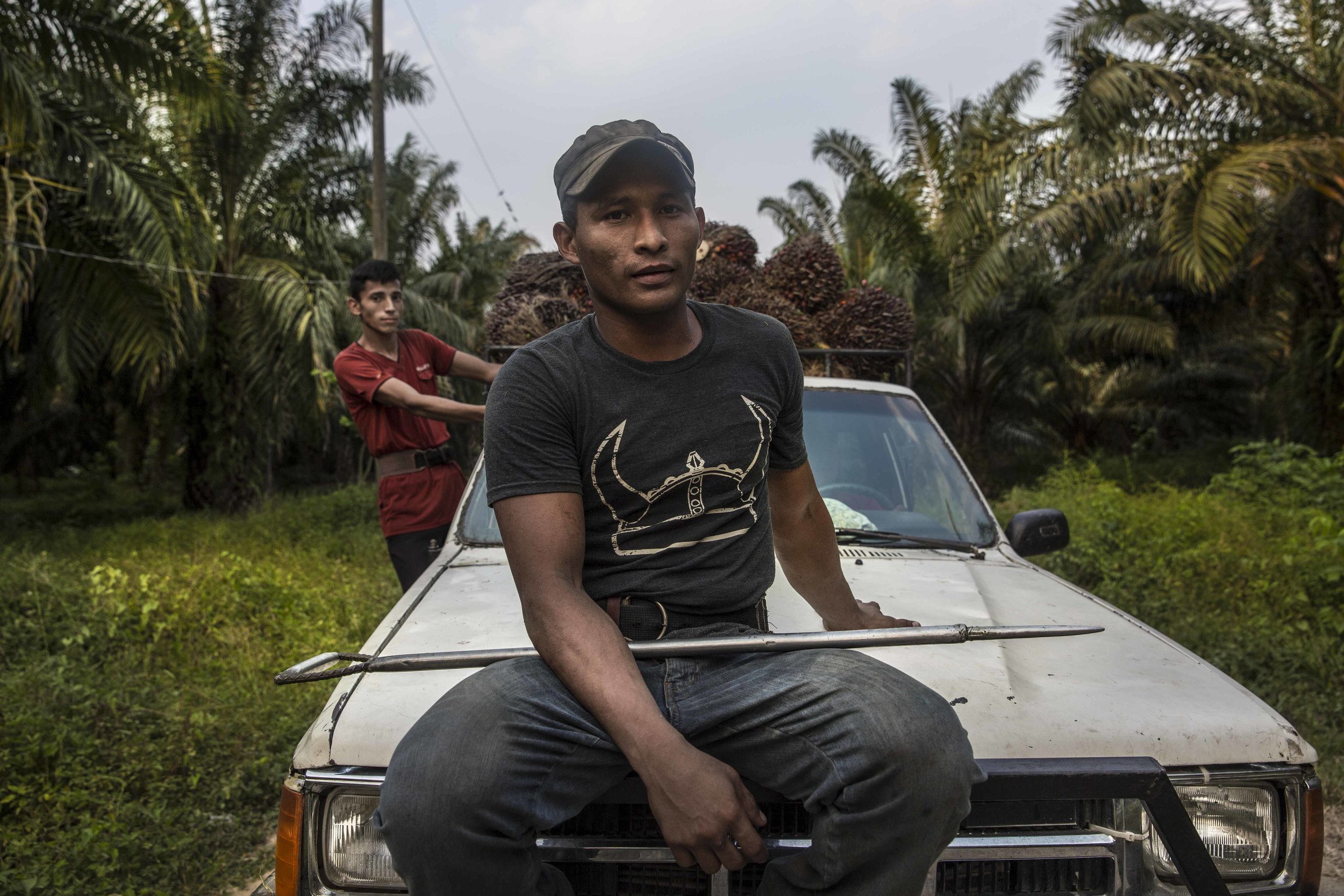
Peasants in the palm oil fields, outside the city of Tocoa in the department of Colon, on the Atlantic coast of Honduras. Around 3,000 peasants farmers in Honduras face criminal charges linked to land struggles.
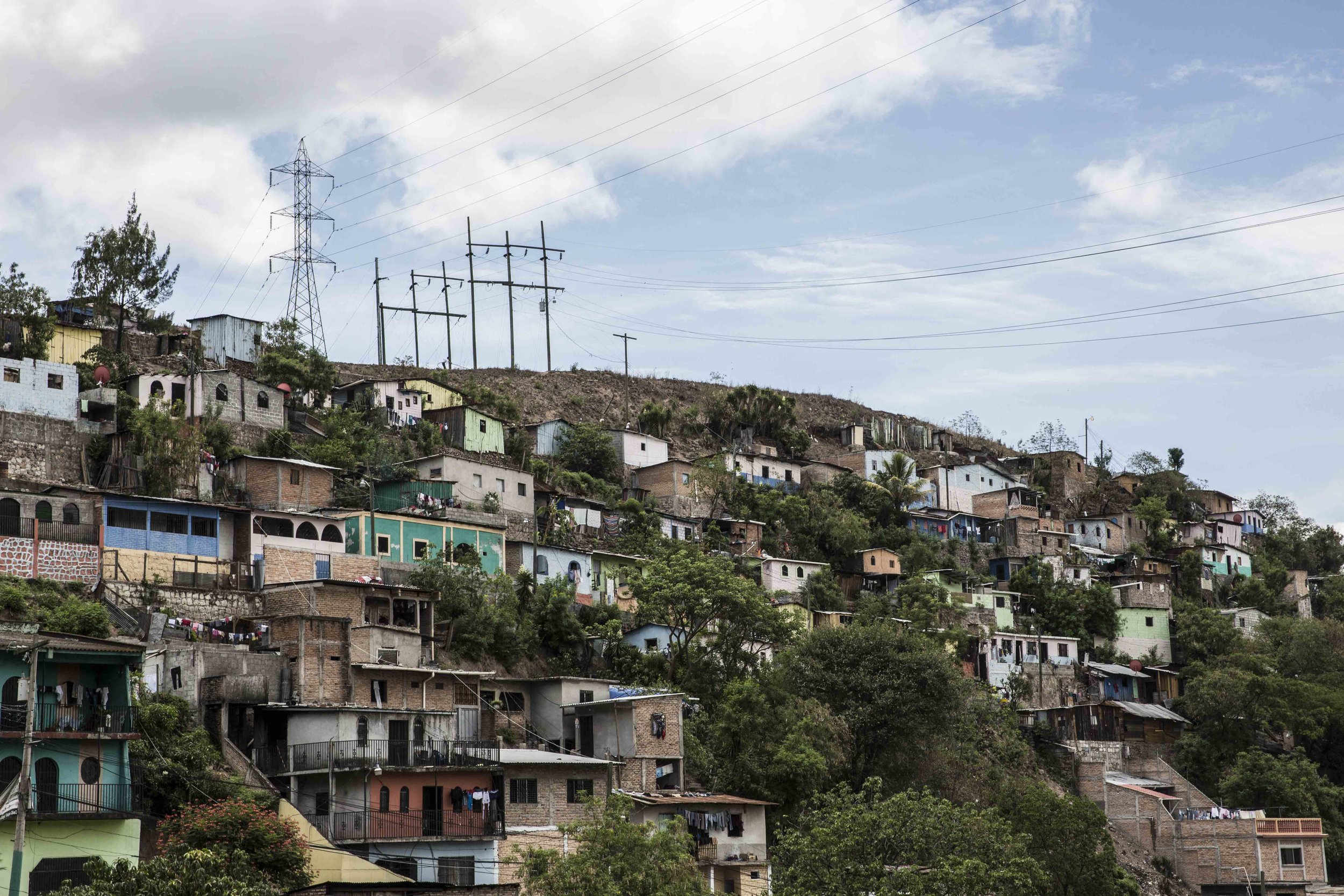
Suyapa, one of the most dangerous neighborhoods of the capital Tegucigalpa.
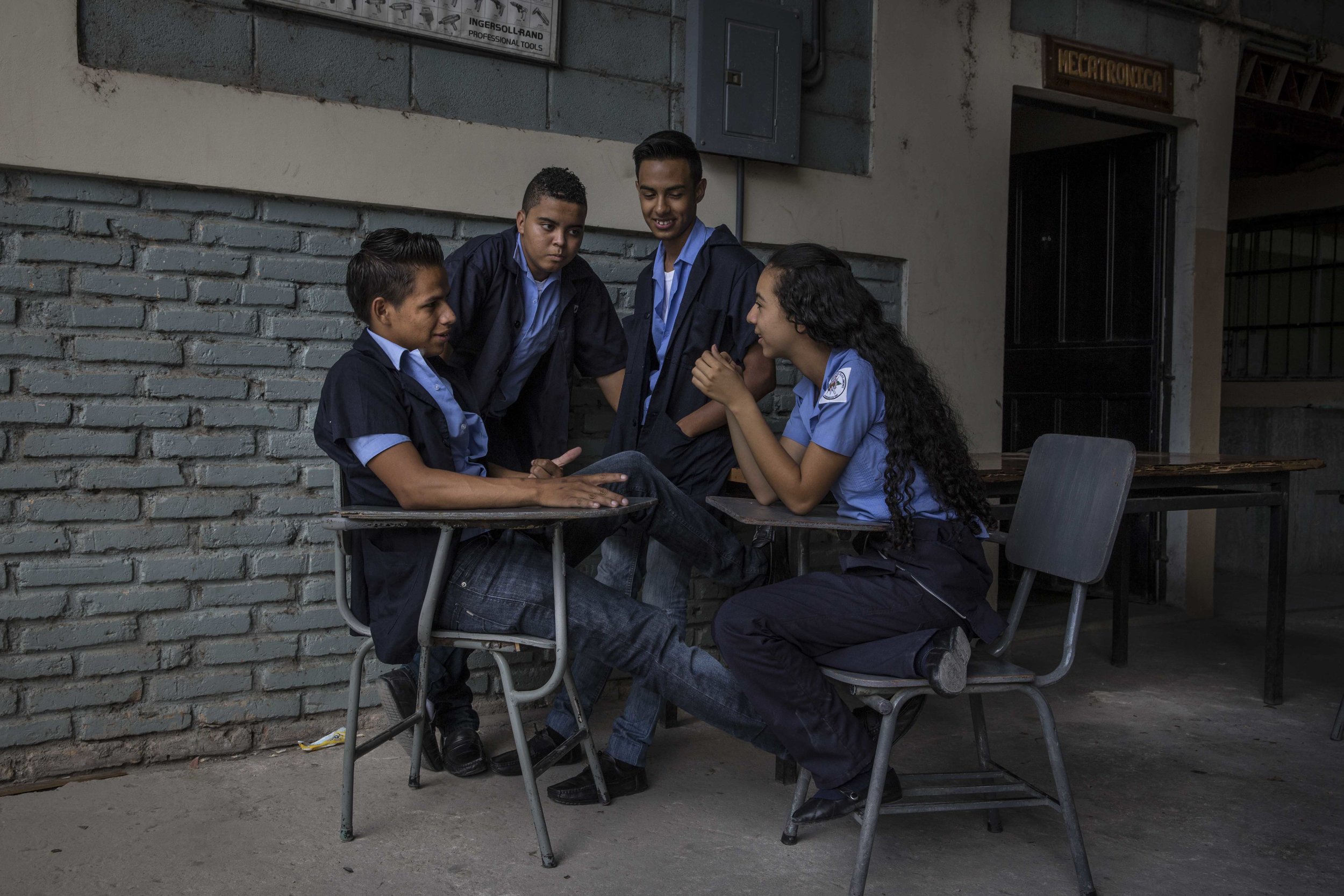
Boy and girls inside the premieres of a school in a vocational school of the capital Tegucigalpa. This neighborhood under the control of the 18 Street Gang (M-18). The M-18, it is also known as the army of the children, because of the age of the members, which are often recruited in schools like this one.
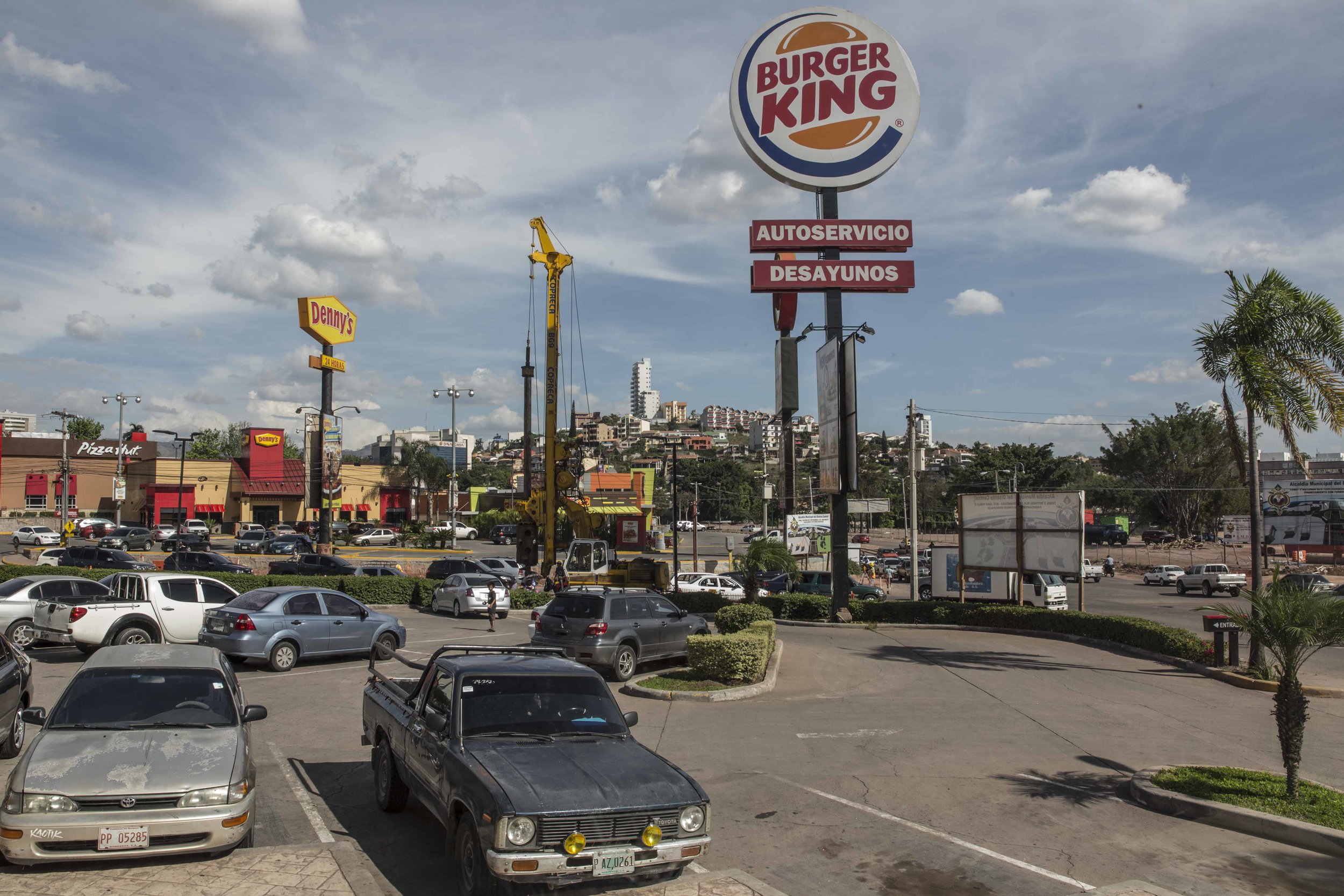
Tegucigalpa, capital of Honduras. View of the parking space, in the Presidential palace area.
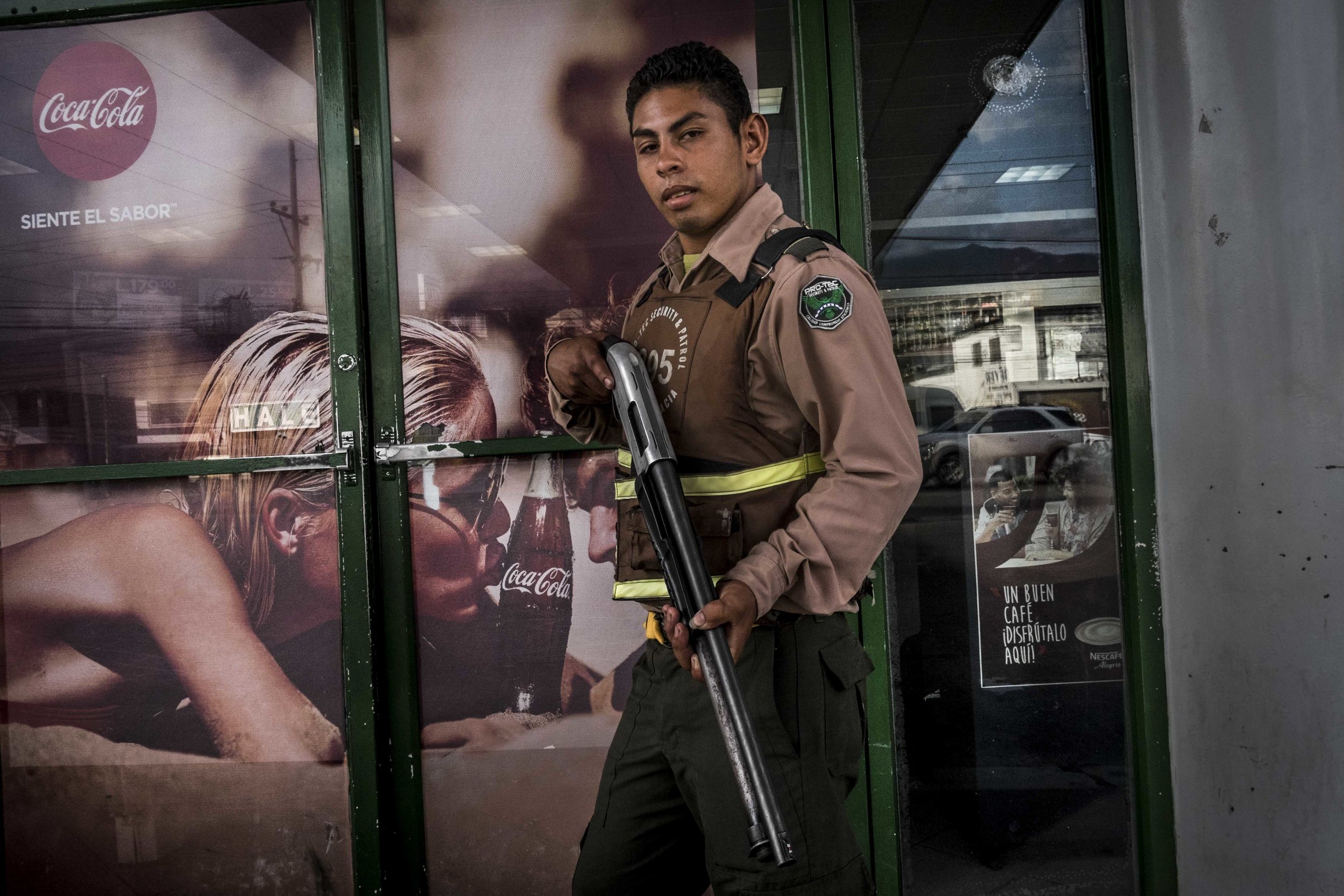
An armed guard at the entrance of a supermarket in a rest area in Hondruas.
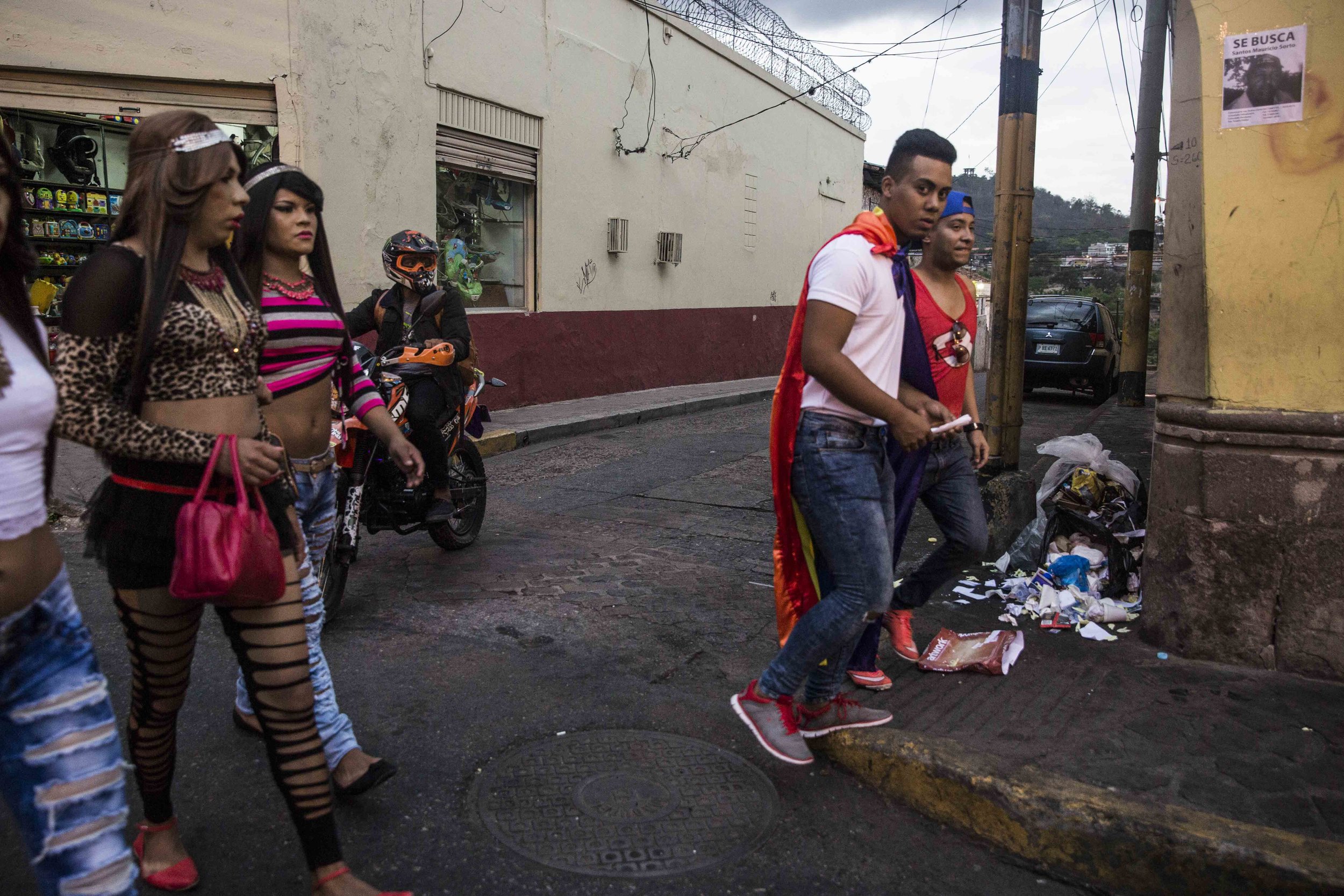
During a gay pride in the capital Tegucigalpa. Despite the fact that discrimination against LGBT people is illegal in Honduras, international human rights organizations have stated that LGBT people have been targeted by the military government for harassment, abuse and murder.
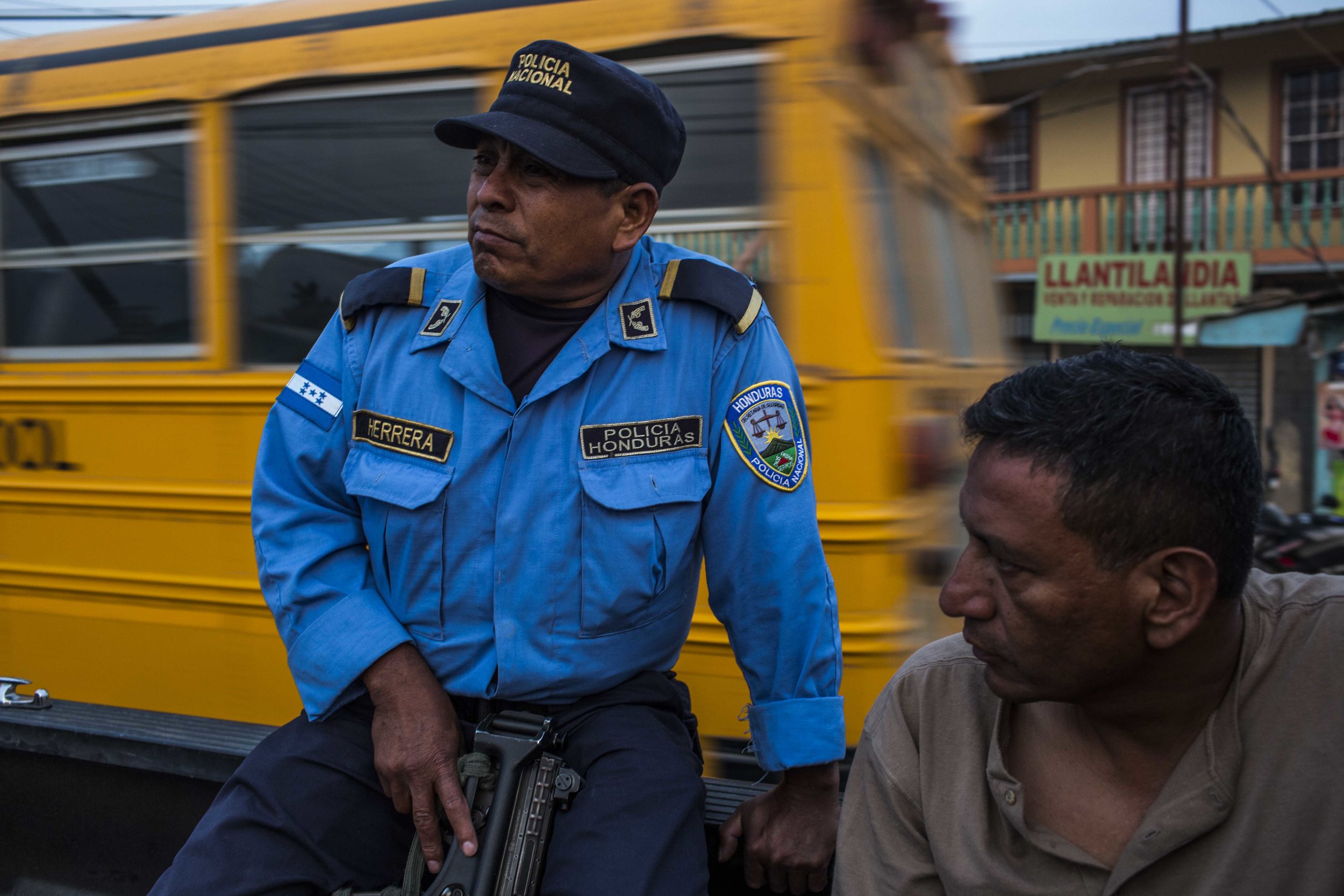
An armed escort home after a conference, the former husband of Berta Caceres, environmental activist assassinated in early March 2016. He, too, such as Caceres, is a member of Cophin group, a very active environmental activist group across the country.
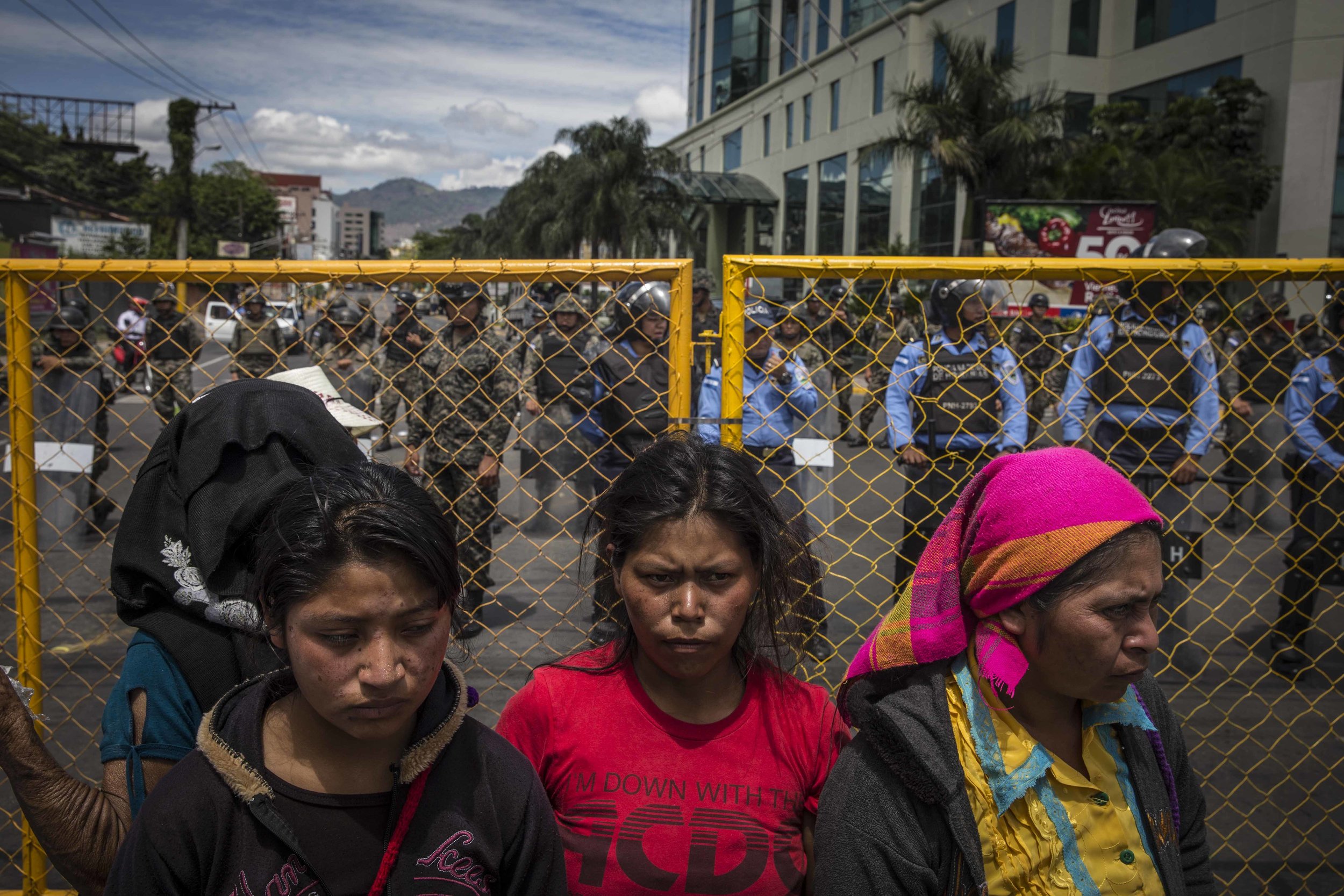
Women of the Lenca indigenous population, during the event in memory of Berta Caceres, not far from the presidential palace in the capital Tegucigalpa. The people Lenca is one of the most negatively marked by the construction of the dam that would divert the river from sostemanto to their community.
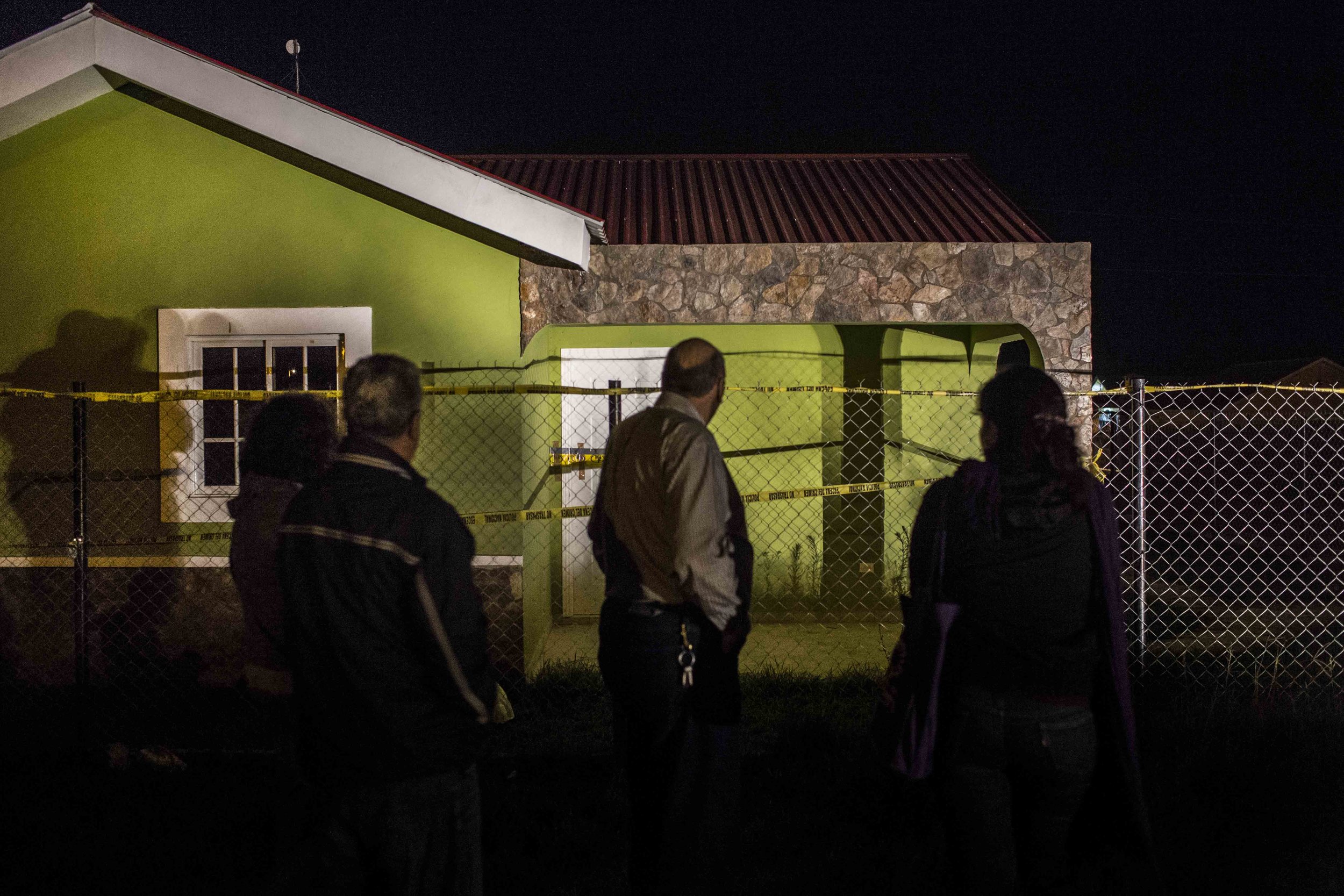
Members of the organization Cophin, out of the house where the beginning of March, a commando of two people at night murdered in cold blood environmentalist Berta Caceres, their colleague and friend.
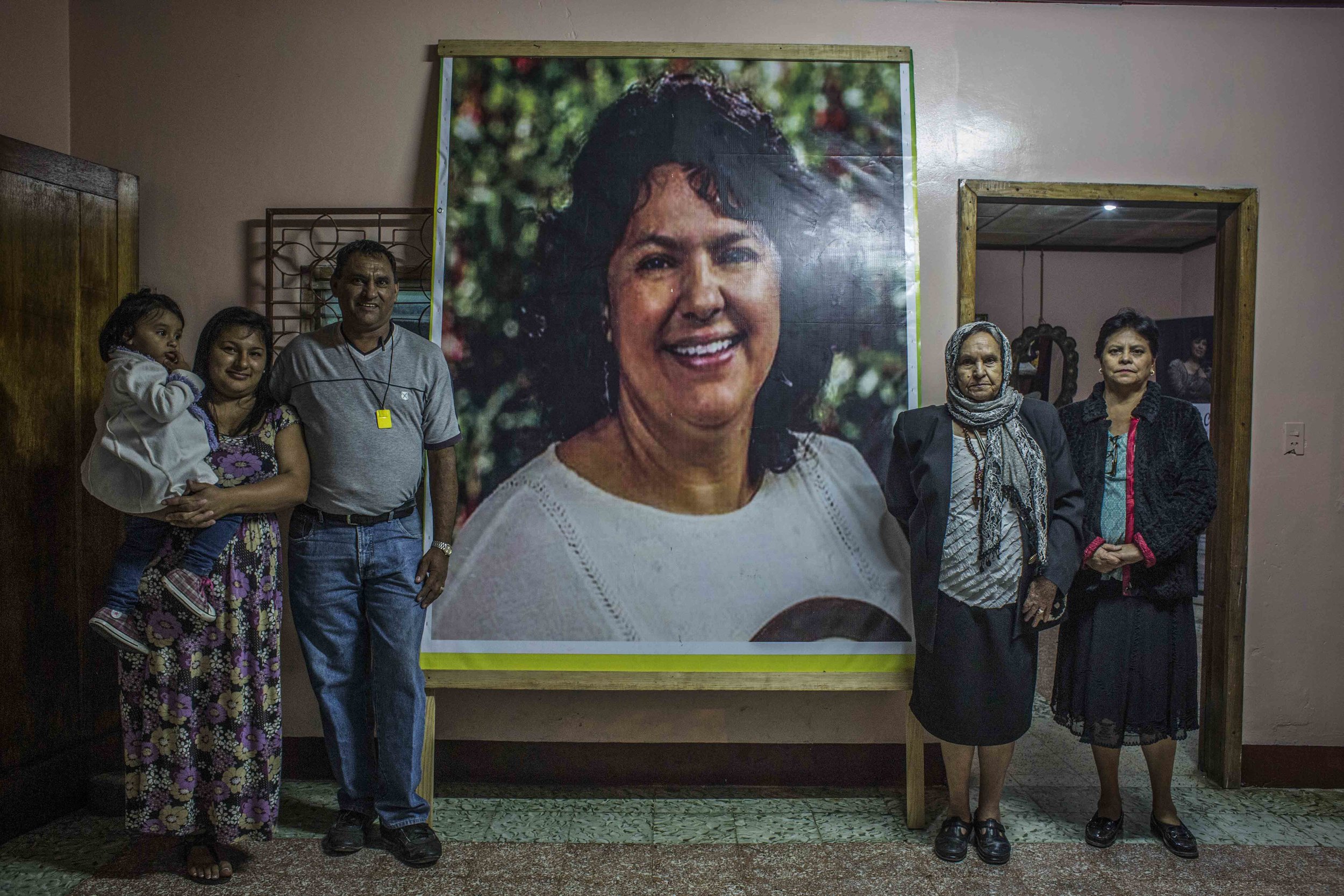
The family of Berta Caceres, mother's sister and brother-in-law with her daughter, posing next to poster of Berta , affixed at the entrance of the family home, in the city of La Esperanza, Honduras.
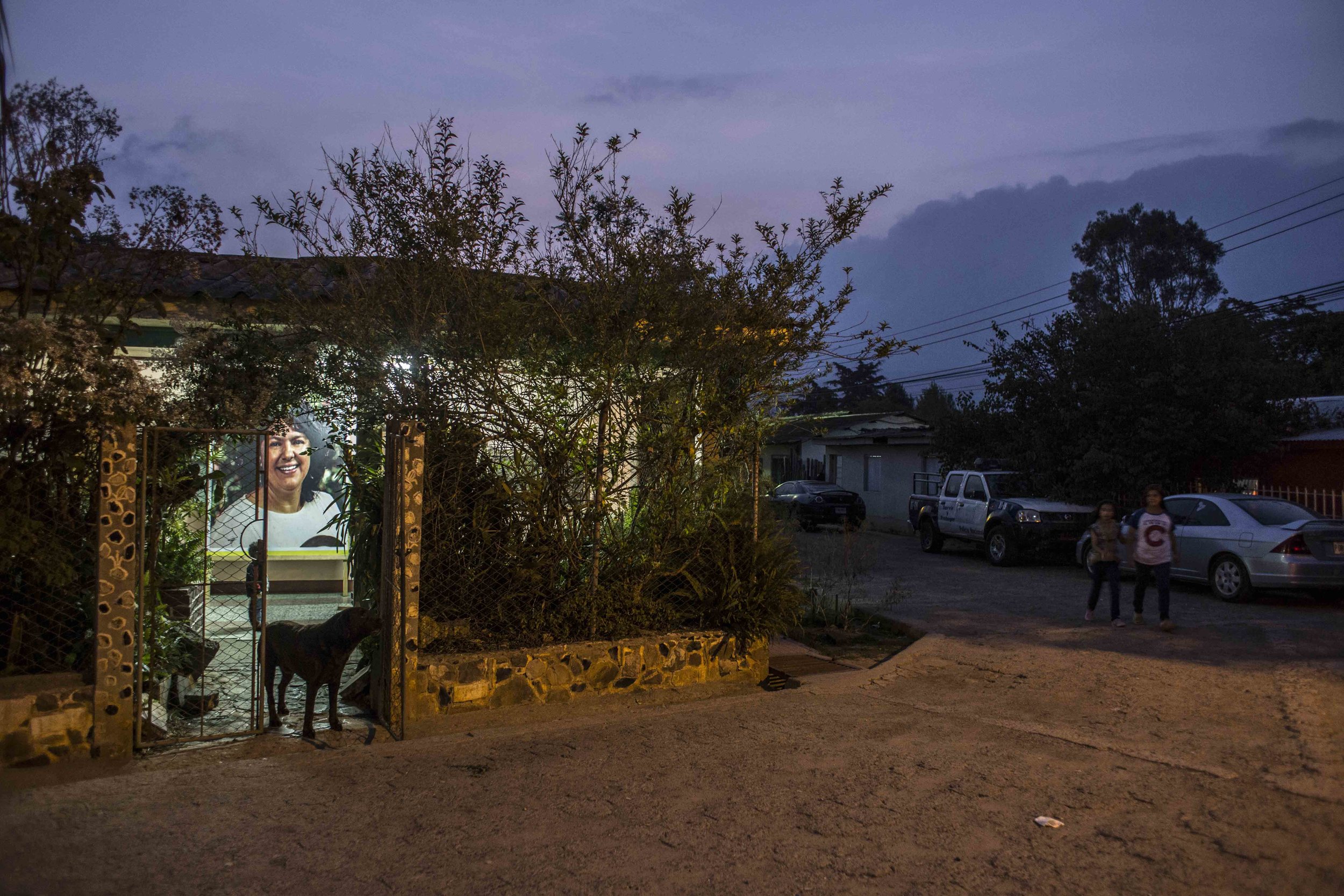
A big photo of Berta Caceres, seen from the street, place inside the family home in his memory, in the city of La Esperanza, Honduras. The house of his assassination is constantly guarded by a police patrol.
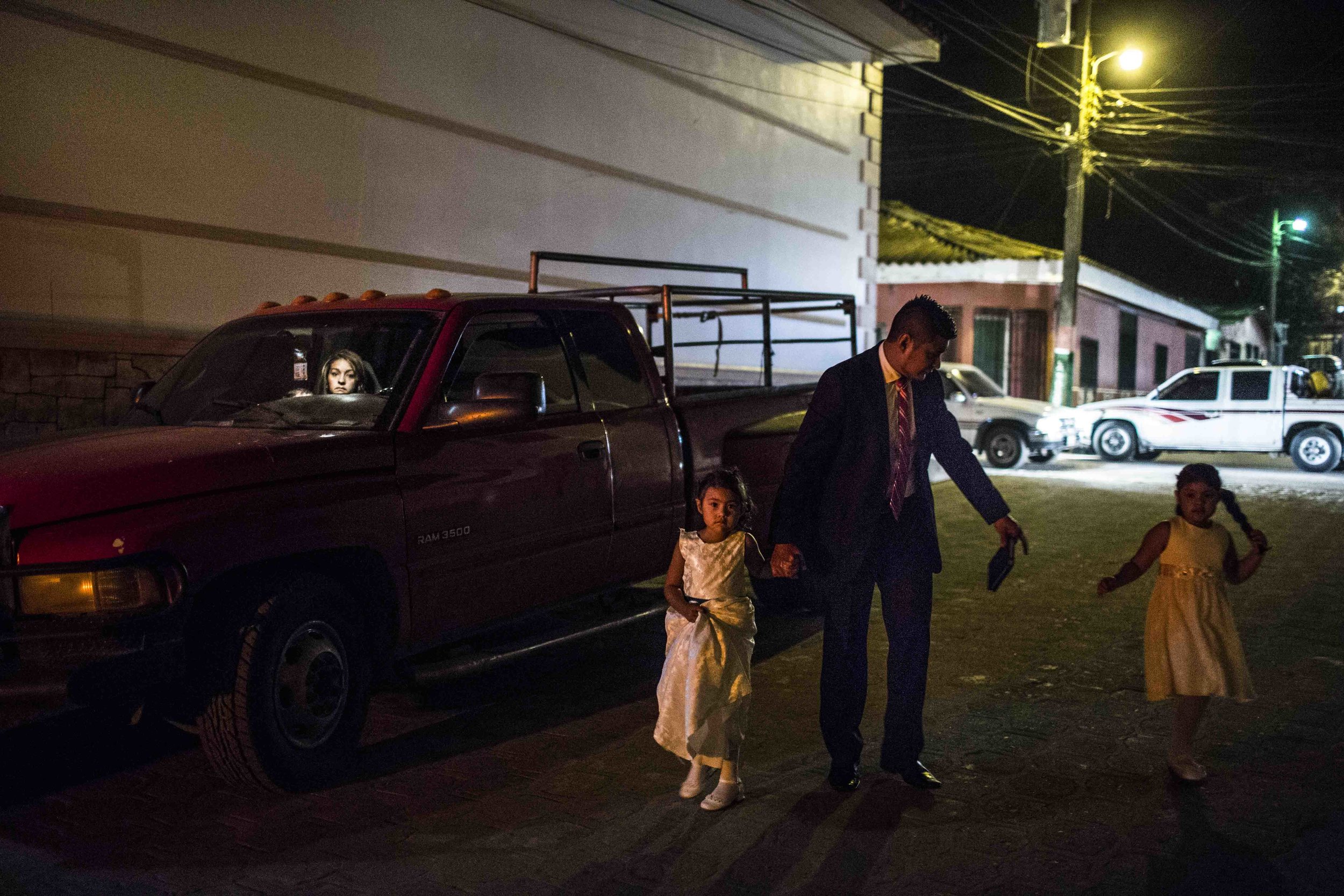
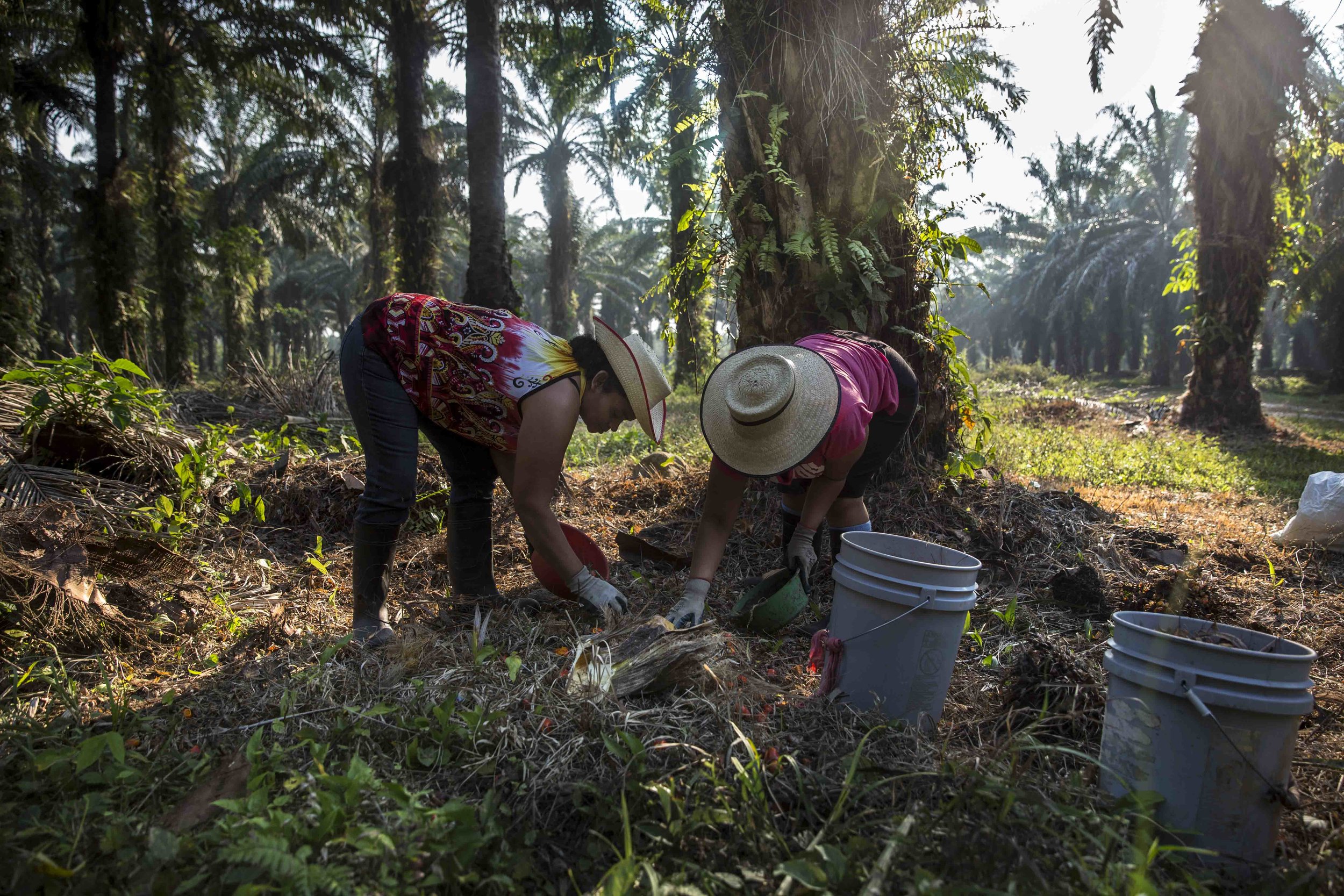
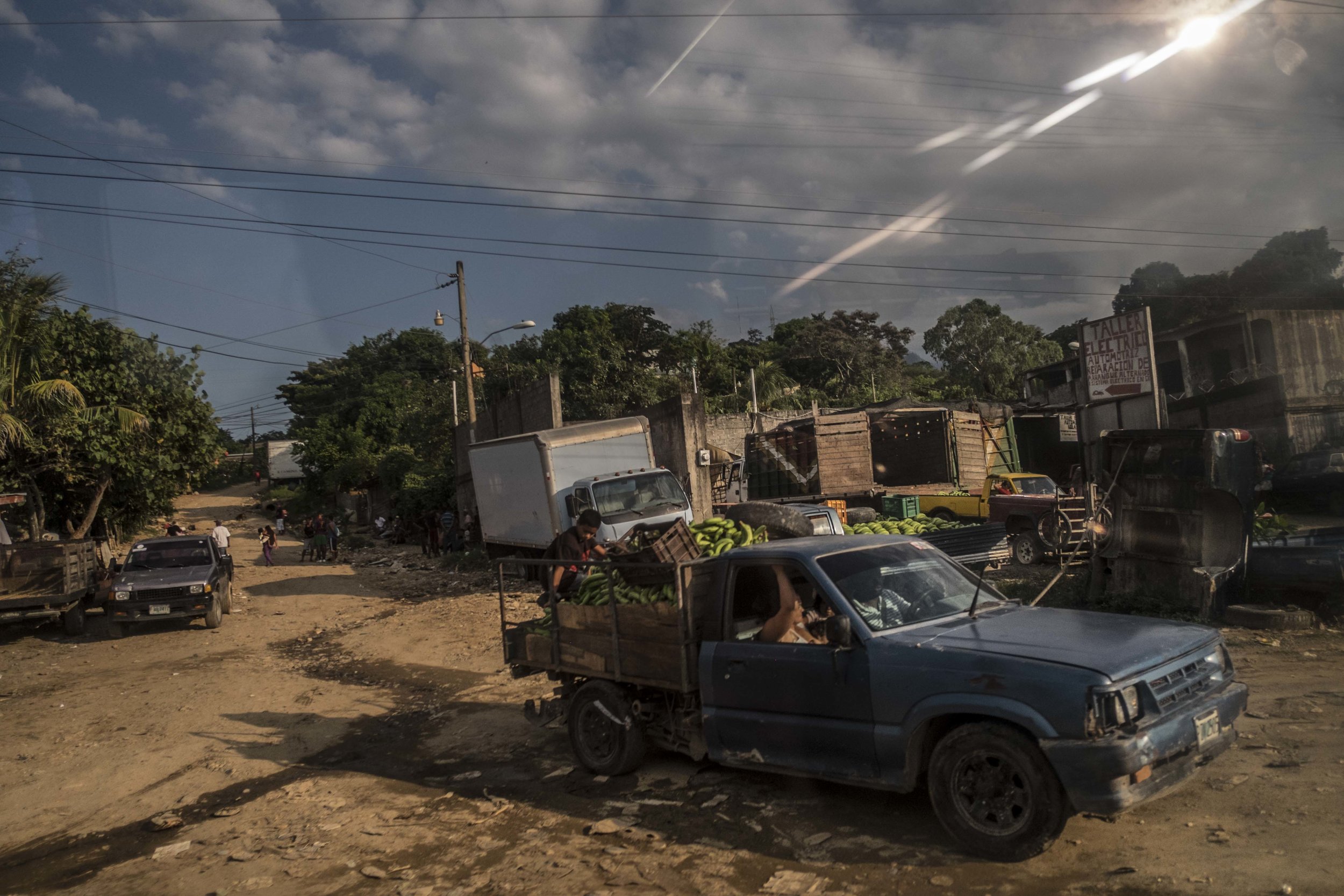
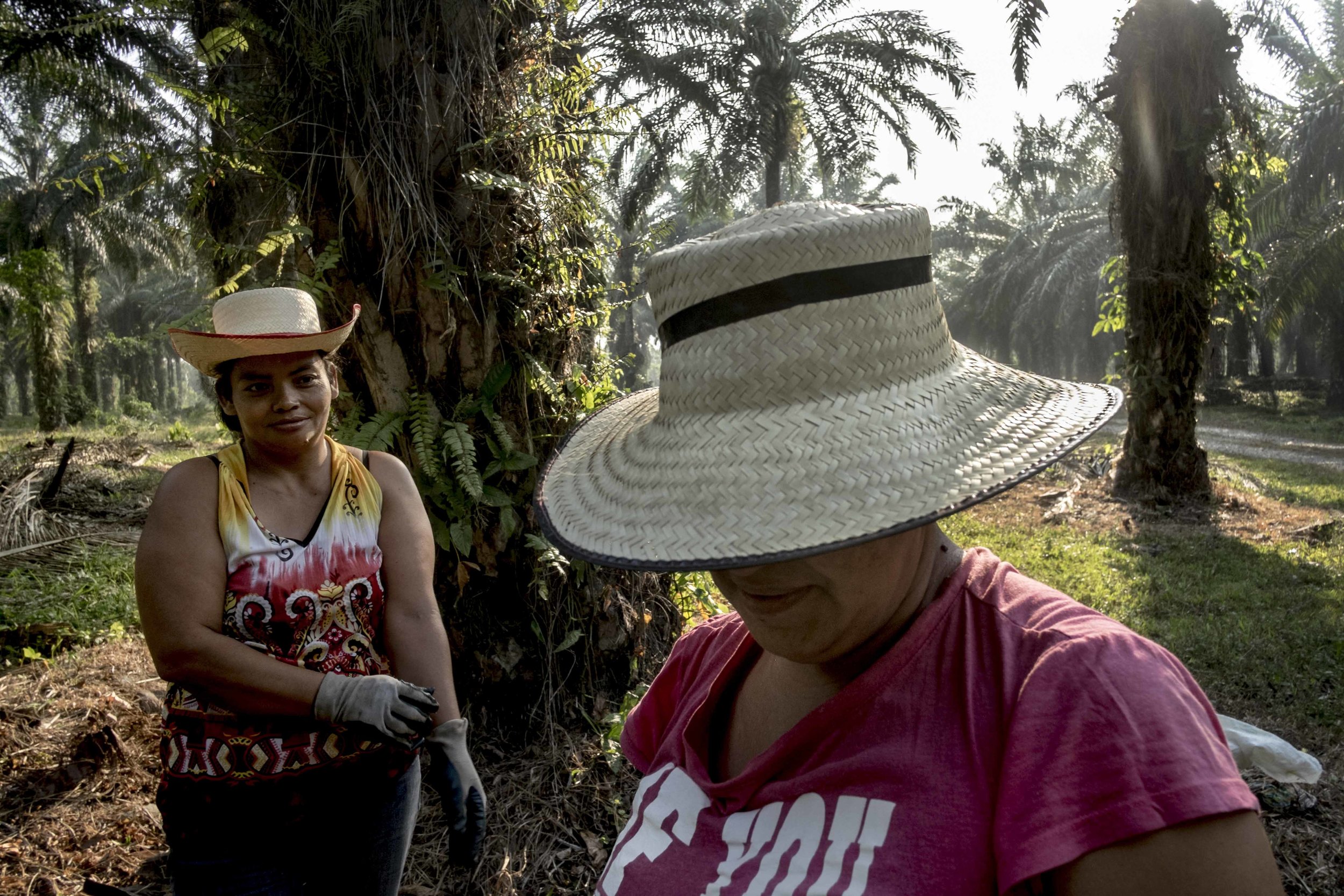















































Tegucigalpa at dawn, capital of Honduras.
Youngsters tend to leave the countryside areas, a hotbed of violent con ict over land, to pour into big the two major cities of Honduras, Tegucigalpa and San Pedro Sula, where they find no job opportunity and this makes them more likely to end up working for the gangs.
The crime scene of the murder of two brothers, Carlos Amador 22, and Edwin Amador, 20, murdered in cold blood in the streets of the Suyapa district, Teguciaglpa, capital of Honduras.
Police on the site of the murder of two brothers, Carlos Amador 22, and Edwin Amador, 20, murdered in cold blood in the streets of the Suyapa district, Teguciaglpa, capital of Honduras.
The relatives, brother and mother of two boys, Carlos Amador 22, and Edwin Amador, 20, murdered in cold blood in broad daylight on the streets of Suyapa neighborhood, Teguciaglpa, capital of Honduras.
Junior Ixael Osorto Banegas, 18, murdered with machine guns the night before in a neighborhood of the capital city Tegucigalpa.
The gates as classroom doors in a vocational school of the capital Tegucigalpa. This neighborhood under the control of the 18 Street Gang (M-18). The M-18, it is also known as the army of the children, because of the age of the members, which are often recruited in schools like this one.
Father and son walk by next to the pool of blood left by the dead body of Edwin Amador, 20, murdered in cold blood in the streets of the Suyapa district, Teguciaglpa, capital of Honduras.
Young men in the football field of the Guadalupe Carney community, outside the city of Tocoa in the department of Colon, Aguan valley, on the Atlantic coast of Honduras. Insecurity in the Aguan valley has an active role in displacing people from their lands, especially young people and drive them to the major cities of Tegucigalpa and San Pedro Sula, where they often meet financial insecurity and end up join either Mara Salvatrucha (MS-13) and 18 Street Gang (M-18), the two most important street gangs in the city.
A peasant in African oil palm plantations in the Bajo Aguan region. Various farming communities who live in the valley of Bajo Aguan, on the Atlantic coast of Honduras, suffer repression and live in a situation of violence with a high level of murders among peasants, especially after the coup of 1999. That has effectively decreed a very serious situation in terms of agrarian conflict, the most violent in the last fifteen years of the history of violence against peasants in Central America.
Boys in their community, outside the city of Tocoa in the department of Colon, in the Aguàn valley on the Atlantic coast of Honduras. UN Office on Drugs and Crime reported that drug traffickers in the Aguàn region allegedly contracted member of a gang denominated Mara 61 to defend their operations in the area.
Members of the Guadalupe Carney community, outside the city of Tocoa in the department of Colon, Aguan Valley, Honduras. In some rural areas of the country, things are quite and murder and violence is considered a city problem. In others, like the Aguan Valley where state security forces as well as US forces have been deployed with the purpose of fighting against drug trafficking, the sensation of war is present.
Young men in the football field of the Guadalupe Carney community, outside the city of Tocoa in the department of Colon, Aguan valley, on the Atlantic coast of Honduras. Insecurity in the Aguan valley has an active role in displacing people from their lands, especially young people and drive them to the major cities of Tegucigalpa and San Pedro Sula, where they often meet financial insecurity and end up join either Mara Salvatrucha (MS-13) and 18 Street Gang (M-18), the two most important street gangs in the city.
A boy searches for plastic material, in the main landfill in Tegucigalpa, which is under control of the local gangs. Everything is then sold for a few US dollars and in this way many make their living.
The family of a boy murdered in a Tegucigalpa neighborhood, awaits the arrival of forensic crime scene.
Honduran police officers guard the corpse of a woman, who was killed along with three others and a boy, apparently as a result of drug-related issues, in one of the districts of the capital Tegucigalpa.
A boy mourns his brother, assassinated in a neighborhood, of Tegucigalpa, capital of Honduras.
The pressure that violence in the countrysides puts on the locals is intense and many have to flee, either abroad or to the major cities, Tegucigalpa and San Pedro Sula.
A man in front of his house in the campesino community of Guadalupe Carney in Aguán region, not far from the city of Tocoa in the department of Colon, on the Atlantic coast of Honduras. Community members denounce intimidations by private security forces in the area, in response to the peasants fights for land property and usage. About 60 percent of the palm oil exported from Honduras comes from this region.
Relatives and friends of a boy murdered in the street a few days earlier, pay homage to the funeral held in a church building, a few steps from the place of the murder, in one of the most dangerous neighborhoods of the capital Tegucigalpa.
Francisco Ramirez, in the Guadalupe Carney community, belongs to the Aguán peasant organization. Francisco works in oil palm plantations. He and other farmers families have occupied a land that had been granted to them through the governmental agrarian reform but was later privatized. For two months they resisted occupying the ground before being evicted. They tried to go back, and felt into an ambush of the private security armed forces protecting the land. There were five deaths, and Francisco was hit by a bullet in the face, that tore the teeth and gum.
Representatives of the peasants organizations of men and women working in the African oil palm plantations in the Colon department, Aguan region, during assembly. It is not uncommon to see civilians bearing arms in Honduras, nor it is illegal, but in the Colon department a new law introduced in 2011 prevents the carrying of weapons, but doesn't apply to police soldiers or private security guards.
Family in the Guadalupe Carney community, outside the city of Tocoa in the department of Colon, Aguan valley, Honduras. Insecurity in the Aguan valley has an active role in displacing people from their lands, and drive them to the major cities of Tegucigalpa and San Pedro Sula.
On the streets of Suyapa, one of the most dangerous neighborhoods of Tegucigalpa.
Lemus Irma Amaya, along with members of the small community Guadalupe Carney, outside the city of Tocoa in the department of Colon, Honduras. Irma is the coordinator of (OPDHA) Permanent Observatory of human rights in the Bajo Aguan, representative of the peasants' movement, she was wounded during an assassination attempt against her November 19, 2015 while traveling by motorcycle with his partner who was also a defender of peasants rights , he had suffered an assasination attack a week before Irma.
Relatives and friends of a boy murdered in the street a few days earlier, pay homage to him at his funeral held in a church building a few steps from the place of the murder, in one of the most dangerous neighborhoods of the capital Tegucigalpa, Honduras. The boy had just started college and according to the relatives, he did not belong to any street gang.
Police armed men, guarding the area where some weapons that are believed to have been used to massacre three women and a guy few hours before in the capital Tegucigalpa, Honduras.
Two boys, suspected of the murder of three women and a boy a few hours before in a Tegucigalpa neighborhood, are held by the police to be later interrogated.
Relatives and friends of a boy murdered in the street a few days earlier, pay homage to him at his funeral held in a church building a few steps from the place of the murder, in one of the most dangerous neighborhoods of the capital Tegucigalpa, Honduras. The boy had just started college and according to the relatives, he did not belong to any street gang.
The cemetery in the settlement colony called "Divino Paraíso" (Divine Paradise) in the capital Tegucigalpa, one of the most dangerous neighborhoods because under control of M-18 street gang. In this cemetery many gang members are buried.
Inside the headquarters of COFADEH (Committee for Relatives of the Disappeared in Honduras), an organization that documents human rights violations, and works to help the relatives of victims of enforced disappearances and assassinations.
Boy and girls inside the premieres of a school in a vocational school of the capital Tegucigalpa. This neighborhood under the control of the 18 Street Gang (M-18). The M-18, it is also known as the army of the children, because of the age of the members, which are often recruited in schools like this one.
Peasants in the palm oil fields, outside the city of Tocoa in the department of Colon, on the Atlantic coast of Honduras. Around 3,000 peasants farmers in Honduras face criminal charges linked to land struggles.
Suyapa, one of the most dangerous neighborhoods of the capital Tegucigalpa.
Boy and girls inside the premieres of a school in a vocational school of the capital Tegucigalpa. This neighborhood under the control of the 18 Street Gang (M-18). The M-18, it is also known as the army of the children, because of the age of the members, which are often recruited in schools like this one.
Tegucigalpa, capital of Honduras. View of the parking space, in the Presidential palace area.
An armed guard at the entrance of a supermarket in a rest area in Hondruas.
During a gay pride in the capital Tegucigalpa. Despite the fact that discrimination against LGBT people is illegal in Honduras, international human rights organizations have stated that LGBT people have been targeted by the military government for harassment, abuse and murder.
An armed escort home after a conference, the former husband of Berta Caceres, environmental activist assassinated in early March 2016. He, too, such as Caceres, is a member of Cophin group, a very active environmental activist group across the country.
Women of the Lenca indigenous population, during the event in memory of Berta Caceres, not far from the presidential palace in the capital Tegucigalpa. The people Lenca is one of the most negatively marked by the construction of the dam that would divert the river from sostemanto to their community.
Members of the organization Cophin, out of the house where the beginning of March, a commando of two people at night murdered in cold blood environmentalist Berta Caceres, their colleague and friend.
The family of Berta Caceres, mother's sister and brother-in-law with her daughter, posing next to poster of Berta , affixed at the entrance of the family home, in the city of La Esperanza, Honduras.
A big photo of Berta Caceres, seen from the street, place inside the family home in his memory, in the city of La Esperanza, Honduras. The house of his assassination is constantly guarded by a police patrol.